#jeanne watches critical role
Text
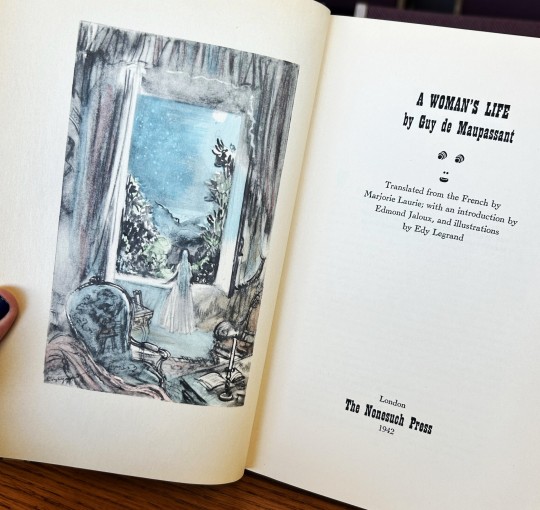

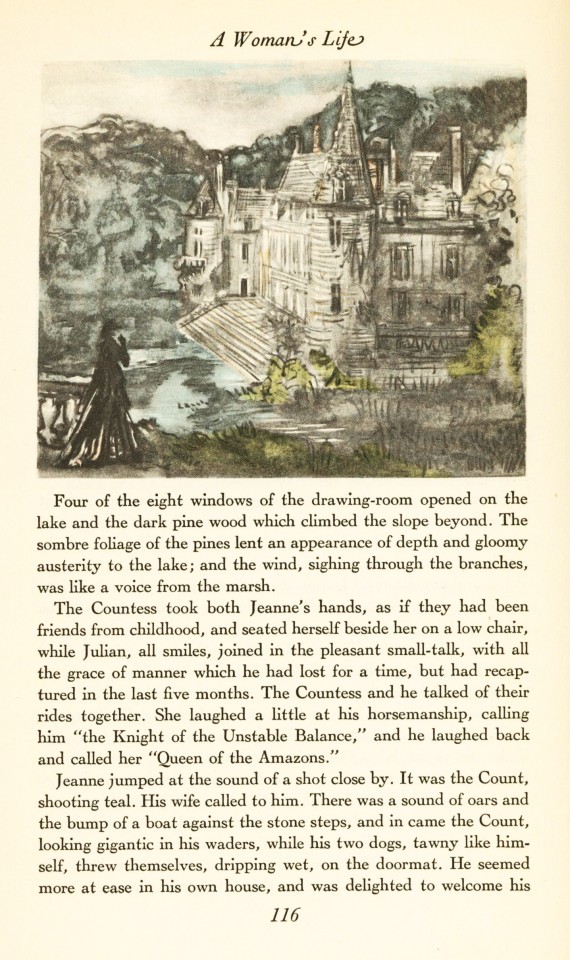


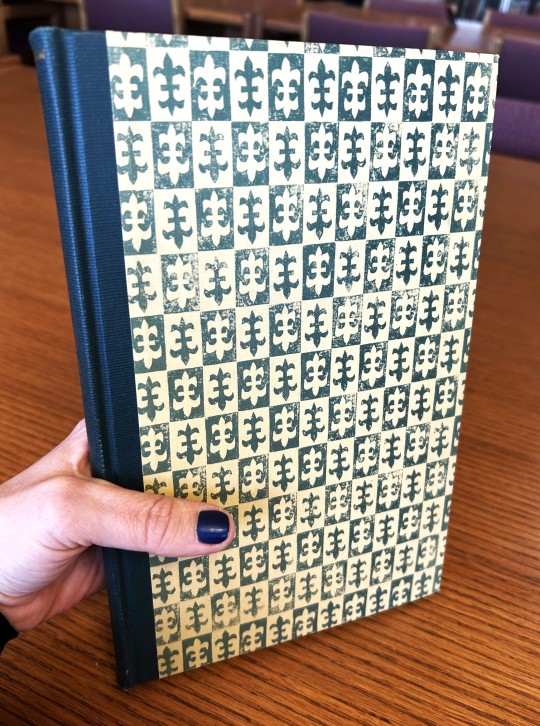
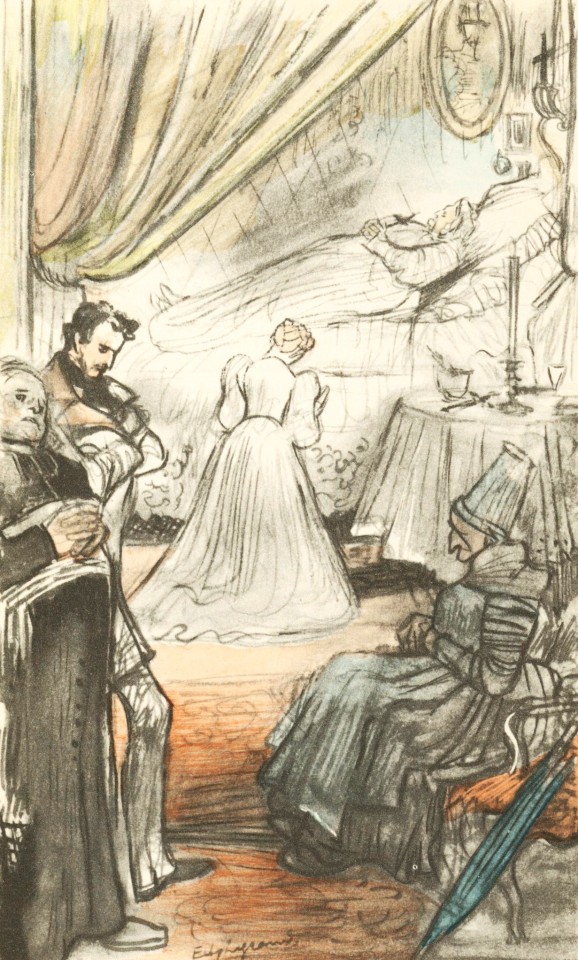
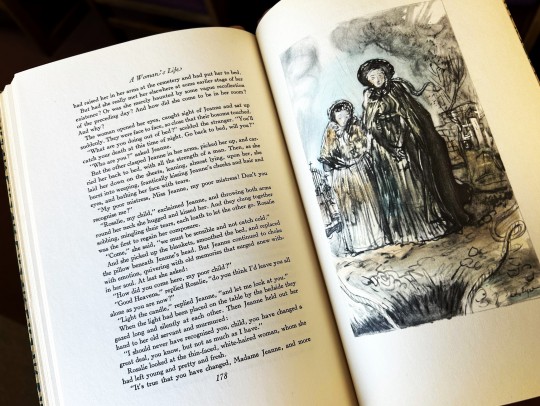
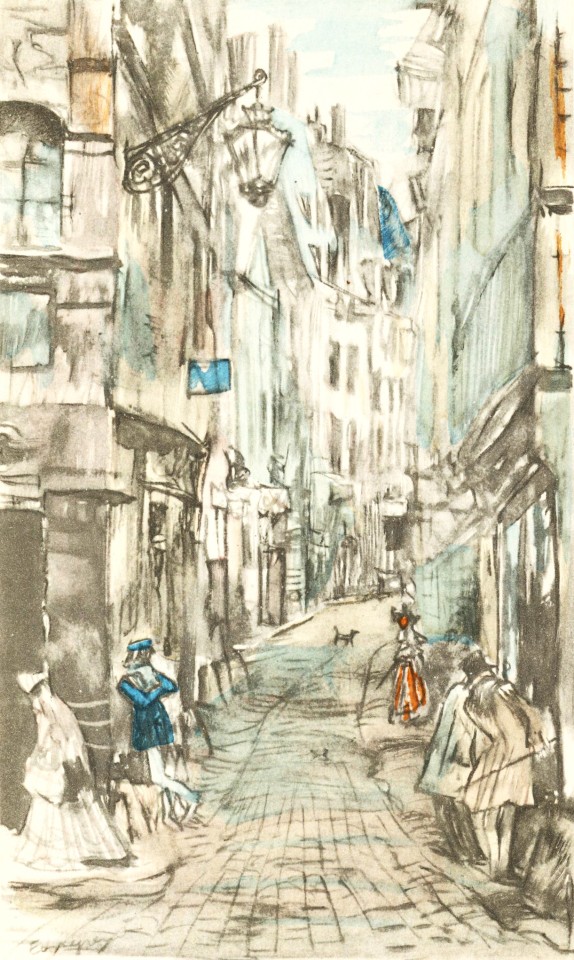

It’s Fine Press Friday!
This week we’re highlighting our 1942 Nonesuch Press edition of French Naturalist writer Guy de Maupassant’s (1850-1893) most popular novel, A Woman’s Life. Translated into English by frequent de Maupassant translator Marjorie Laurie, this publication features an introduction from writer and critic Edmond Jaloux (1878-1949) along with delicately enchanting illustrations by Edy Legrand (1892-1970) which were hand-colored by commercial artist Charlize Brakely (1898-196?), who employed pochoir (stencil coloring) techniques similar to those commonly seen in Parisian fashion illustration. The work was planned and published in London by book designer Frances Meynell (1891-1975) and composed in Monotype cochin typeface by the New York Monotype Composition Company, with letterpress elements printed by Quinn & Boden Company. Meynell and Nonesuch press were known for using a small hand press (an Albion Press) in the design process and mechanical printing techniques in the production process to create books that emulated the quality of hand press publications.
De Maupassant’s work depicted the stratification of human experience across class divides in French society and portrayed the constraints of gender roles in the 19th century with sensitivity and depth. Though A Woman’s Life centers around the personal tragedies and mounting dissatisfactions of Jeanne (an upper-class heiress) it is balanced by characters like Rosalie, a single mother from the working-class peasantry whose own background and perspective on Jeanne’s privilege complicate a purely sympathetic view of her story.
Stéphane Brizé released a celebrated film adaptation of the work in 2017- you can watch a preview for it here.
--Ana, Special Collections Graduate Intern
View more Nonesuch Press posts
View another Edy Legrand post
View more Fine Press Friday posts
#Fine Press Friday#Nonesuch Press#Guy de Maupassant#A Woman’s Life#Edmond Jaloux#Edy Legrand#Charlize Brakely#Frances Meynell#Quinn & Boden Company#monotype#letterpress#pochoir#French literature#Marjorie Laurie#Albion Press#cochin#Ana#fine press fridays
41 notes
·
View notes
Text
Remembering Maria Schneider, the Star of “Last Tango in Paris”

Photograph by Jack Mitchell / Getty
In a new book, translated by Molly Ringwald, Maria’s cousin recalls the fame and turbulence that followed the release of Bernardo Bertolucci’s controversial film.
By Vanessa Schneider
April 13, 2023
Did you know, Maria, that you were almost not cast in “Last Tango in Paris”? You weren’t Bernardo Bertolucci’s first choice. Legend has it that he originally wanted to do a story between two men before quickly abandoning the idea. He was a hot director at the time. His film “The Conformist,” from 1970, which starred Jean-Louis Trintignant and Dominique Sanda, had been a great critical success. With “Tango,” he wanted to show the dark side of the sexual revolution, exploring sex and psychological violence between two people in a Parisian apartment: a run-down forty-five-year-old man named Paul, whose wife has just committed suicide, and a young woman named Jeanne.
In the beginning, the Italian director went to Paris, hoping to re-cast Trintignant and Sanda as Paul and Jeanne. Bertolucci recalled that Trintignant turned it down, saying, “In your film, they’re having sex all the time. Sorry, but I just can’t go nude.” Sanda was pregnant and declined the offer as well. Next, Bertolucci tried to meet with the two biggest actors in France, Jean-Paul Belmondo and Alain Delon. Never the type to waste time, Belmondo refused to even see him. “I don’t do porn films,” he said. Delon’s response was more ambiguous but classic Delon—he said neither yes nor no. Bertolucci’s casting process broke down. And then someone suggested Marlon Brando. The mythic actor of American cinema was older and heavier than he had been in his prime. A string of commercial flops had placed him in the category of Hollywood “has-beens” and he needed cash after having purchased a Polynesian island, which had turned into a money pit. He didn’t know it yet, but his comeback was just on the horizon, percolating in the desire of two young filmmakers—Francis Ford Coppola, who thought of him for the title role in “The Godfather,” in 1971, and Bertolucci for “Tango.”
The first meeting between Brando and Bertolucci took place at the Hôtel Raphael in Paris. Bertolucci described the project to the American actor as the story of a man and a woman who renounce their social identities and only communicate carnally, through their bodies. Brando told him that he wanted to first watch “The Conformist,” so Bertolucci set up a screening for him the same day. Afterward, Brando invited the director to his home in Los Angeles, to discuss the film in detail before the shoot in Paris. The actor agreed to play the role of Paul in exchange for two hundred and fifty thousand dollars and ten per cent of the film’s gross—a significant sum of money at the time.
The director first caught sight of you in a photograph with Dominique Sanda, who had become a friend of yours. His Parisian friends tried to talk him out of casting you. “Everyone said that she’s just a girl who spends all night dancing at Castel’s,” he recounted years later, referring to the Parisian night club. “No one saw in her what I saw, something wild behind the androgynous body with the enormous breasts.” At one point, before you started filming, he asked you to have breast surgery to “re-do” them. You refused. It was your sole act of rebellion. From then on, nothing would be asked, only demanded.
You hesitated to do the film at first, you later admitted, since you “didn’t totally understand the script,” though you did recognize that it was daring. Your agent swept away your reservations. “You can’t refuse a leading role opposite Marlon Brando!”
You’re nineteen years old, still a minor, about to embark on one of the most scandalous films of the nineteen-seventies. Your mother had to sign the contract on your behalf so that you could accept the role.
The first scenes you film are with Jean-Pierre Léaud, the favored actor of Truffaut and Godard, who plays your fiancé and an aspiring filmmaker. Bertolucci didn’t want to put you face to face with the icon right away, fearing you would be intimidated.
When you do meet Marlon Brando for the first time, it’s on the Pont de Passy, just as you’re about to shoot the film’s opening sequence, where your characters cross each other on the bridge. You find it funny that he’s wearing lifts in his shoes and think, Oh, he’s not as big as all that. There’s a childlike sweetness you perceive in him as he initiates small talk with you. He asks you what your zodiac sign is.
“Aries,” you tell him.
“Me, too,” he says. “Rising?”
“Libra.”
“We’ll get along just fine,” he says, “which is good, because I believe we have a few intimate scenes. . . .” He gives you a kiss on the cheek, as a father would give to his daughter.
Your first real scene with him takes place in the apartment. Any doubt about the nature of the film is immediately gone. For the sex scenes, or any scenes with nudity, Brando requests a closed set and Bertolucci complies, making the set off limits to anyone not directly involved with the film. Photographers and other onlookers wait on the sidewalk every day for the actors to appear. Some even rent apartments across the street, hoping to get a shot.
Gossip spreads throughout Paris that the Italian director is making something risqué and disturbing.
Brando imposes rules and conditions for everyone involved with the shoot. He does away with the usual hierarchies of film production. It’s out of the question for him that the crew should eat less well than the actors. During breaks, he offers drinks and sandwiches to everyone, paid for out of his own pocket. “He respected all people,” you later say. “No matter how big or small. . . . I’ll always remember him as generous, a man of integrity.”
Brando goes back to his hotel every day at 6 p.m. and refuses to work on the weekends. Bertolucci doesn’t object. For you, however, there is no such reprieve. You film take after take until midnight, and on Saturdays you film with Léaud. It’s more brutal than a marathon. By the end of the three-month shoot, you’re drained and exhausted and you’ve lost twenty-two pounds. The crew often finds you in tears. Some try to comfort you with a word or a look; others say nothing, pretending not to notice. She’s lucky, this little unknown, sharing the screen with the great Brando. . . . She doesn’t get to complain. Once you dare protest to the director: it’s too much filming, fourteen hours a day, every day. You later tell me that Bertolucci responded without even looking you in the eye. “You’re nothing. I discovered you. Go fuck yourself.”
The Italian director knows that he is making something volcanic—as captivating as it is incendiary. The crew members must have been sworn to secrecy. The pairing of you and Brando works well, and Bertolucci is jubilant. The girl is docile, he thinks, and the actor brings his wounds to the role with an intensity beyond the director’s wildest dreams. Brando gives him advice about camera placement and actors’ performances. Bertolucci is fascinated by the experience of this Hollywood giant. You observe their dynamic, intrigued, watching as Brando asserts his authority. At the last moment, you are brought in to shoot your scenes. Eventually, Bertolucci barely speaks to you, only to Brando.
The director is fixated on the cinematography. He wants the film to be orange, the color of the seventies—of hippies, of the California sun, of Indian spices. The first rushes are reassuring; they have the tint he’s looking for, but he’s not quite satisfied. In the apartment, with the shutters closed, it seems that he still feels there’s something missing—some climactic event that can push the film beyond what would be considered merely audacious.
One morning, Bertolucci takes Brando aside and suggests a scene that isn’t in the script. The men agree that nothing should be said to tip you off—that it’s better if you are taken totally by surprise. Did you sense a particular atmosphere on the set that day, see complicit looks among the director, actor, and crew? Or were you too tired by that point to question anything? Who thought of the butter? Was it Brando, Bertolucci, or both?
Rolling, action . . . . You and Brando are lying on the floor, dressed. Suddenly, Brando turns you over, roughly pulls down your jeans, and, grasping a mound of butter in his hand, he shoves it between your legs while thrusting his pelvis against your backside. You fight, you scream and cry. It’s impossible to escape; Brando’s body is pinning you to the floor. Bertolucci keeps the camera trained on your anger and terror. There’s only one take. It doesn’t last long, but for you it’s an eternity. Brando releases his grip and you scramble up, staring at the two of them with murderous rage. In your fury, you destroy the set. After, you go to your dressing room and remain prostrate for hours. The director couldn’t care less; he got what he wanted. He couldn’t have dreamed of better. “She raged against me, against Marlon, against all men,” Bertolucci would comment years later, remembering the scene.
You come out of the filming shattered, sensing this one scene has marked you forever, like a bad tattoo you’ll spend the rest of your life trying to cover up. It doesn’t matter that the sodomy was simulated—it makes you feel dirty and violated. You don’t understand that you could’ve prevented this scene from appearing in the film, since it wasn’t in the script that you had agreed to. You could’ve called a lawyer, filed suit against the producers, and made Bertolucci cut it, but you’re young, alone, and poorly counselled. You know nothing yet about the rules and regulations of the film world. The perfect victim.
Rumors swirl preceding the film’s release. It’s the return of the great Brando! A beautiful, provocative newcomer lights up the film! Bertolucci has really gone too far! At the French première, a few weeks before Christmas, people rush to find a seat. During the opening sequence, a malaise settles over the audience. Jean-Luc Godard storms out after ten minutes, furious and outraged, yelling, “Horrible!” You’re waiting outside the theatre and don’t hear him. You’re probably wearing jeans with boots and a coat that’s too thin to keep you warm. You pace and stomp your feet to prevent them going numb, smoking cigarette after cigarette, listening to the muffled noises coming from the screening room. At the end, the audience departs the theatre in embarrassed silence. They pass by without looking at you.
There’s only one person who approaches you: the actress Jean Seberg. She’s fourteen years your senior, as fair as you are dark. You’ve seen her in Otto Preminger’s “Saint Joan,” Godard’s “Breathless,” and the Romain Gary films. You don’t know it, but the two of you have Marlon Brando in common. It was her admiration of Brando that made her decide, at twelve years old, to become an actress.
Seberg, the American icon of French New Wave cinema, looks different. Her face has been ravaged by a series of sad love affairs and a chronic depression that she attempts to drown in alcohol. She divorced Romain Gary, and two years before the release of “Tango” her baby daughter, Nina, died. In September, 1979, after multiple previous suicide attempts, her naked body will be found wrapped in a blanket in the back of her white Renault, on a street in the Sixteenth Arrondissement.
It’s the first time you’ve met her, but she wraps her arms around you and holds you tight against her chest. She’s small and bony like a malnourished child, but the warmth of her body feels familiar. She buries her face in your brown curls and whispers in your ear, “Take care of yourself.”
“Last Tango in Paris” comes out in theatres on the fifteenth of December, 1972. It fails to pass the censors and receives the rating “forbidden for anyone under eighteen,” which only piques the public’s curiosity. Immediately, it becomes the preordained object of scandal. Catholics mobilize, and a complaint is filed in Italy, which the far left views as an affront to freedom of expression. “Tango” becomes the latest symbol in an ancient fight between the guardians of a certain moral order and the defenders of the artist’s right to create—the wet blankets versus the squeaky wheels. An Italian court condemns Bertolucci, Brando, and you to a two-month suspended prison sentence. Copies of the film are destroyed.
For Bertolucci, the controversy is a triumph. His film has succeeded in garnering the passionate response he desired. It’s discussed in bars and restaurants, debated by artists as well as by elected officials. It’s forbidden in the dictatorships of the Soviet Union and Franco’s Spain. Democracies, on the other hand, make a point of defending it. The film is released in New York in only one theatre, where tickets are sold out weeks in advance. It’s your first taste of success, but you stay on your guard. It’s hard for you to know what to think when you are as likely to be booed as you are to be showered with compliments. You’re twenty years old.
Meanwhile, just as your career is taking off, Brigitte Bardot, a friend with whom you’ve been staying, announces that she will retire. She’s had it with films. From now on, she wants to devote her life to animals, insisting they are far better than humans. You don’t bother to try to talk her out of it, since you know there’s no changing her mind. She goes on to say that she’s moving to Saint-Tropez, where she vacationed with her family as a child and where she filmed her great success “And God Created Woman.” When you leave her apartment on the Avenue Paul Doumer, you’re not sure where you’ll go next.
The release of “Tango” is an explosion whose shock waves consume you within a couple of weeks. Nothing has prepared you for what’s coming. The insults on the street, the aggression, and then, conversely, the adulation and the fawning. Doors suddenly swing open, offers come from the directors everyone is dying to work with. There is suddenly too much of everything in your life, too much desire, too much temptation, too much violence and criticism. With the wild grasping of someone drowning, you fall back onto a clichéd pun to explain the excesses of your behavior. “Il vaut mieux être belle et rebelle que moche et re-moche.” (“It’s better to be beautiful and rebellious than ugly and ugly again.”) It’s delivered with a sardonic smile, like you only half believe it.
Since the press has portrayed you as a wanton muse, you play the assigned role. You will be as electric and without boundaries as what’s expected of you. Your first public statements whet the appetites of the gossipmongers. A girl who has grown up too fast, who still has the bloom of youth, taking aim at everything. As a journalist now, I shudder when I read the interviews. You settle the score with your father, the actor Daniel Gélin, with all the rage and sadness of a neglected child. This father who took so long to acknowledge you, who now, as his film roles dwindle, cozies up to the smoldering fire of your success. You take him down with an assassin’s precision: “A bitter man jealous of his own son.” Your famous co-star fares no better. “The Brando myth? Whatever! . . . He’s obsessed with getting old and pays special attention to his makeup. Every morning, someone had to go get him; otherwise he wouldn’t come. He’s also lazy and slow. He never knew his lines; he just improvised. Between takes he went back to his dressing room, supposedly to ‘center himself’ . . . Marlon is temperamental, a big drinker.” I can easily picture the journalists laughing nervously, unsure how to respond.
The press can’t decide what to make of you—whether to love you or to hate you. Feminists wage war over the film. According to them, it goes too far under the guise of sexual freedom. Pointing out your youth—the apple cheeks and the look of confusion in your eyes about what’s being asked of you—they wonder whether what was captured on film was not art but abuse. They underline the nearly thirty-year age difference between you and Brando and note that in almost every scene you’re naked while he remains clothed. And then there’s the infamous sodomy scene. Some sense genuine protest and suffering in your cries.
In our home, we don’t speak about the film. The first time I hear anyone mention it is on the playground when I’m five or six years old: a group of kids laugh and yell, “Pass me the butter!” At first, I pay no attention to them, though what they say confuses me. They repeat it, day after day, and I don’t know why. Finally, I ask my mother about it.
“It’s because of the film,” she snaps, annoyed, then quickly tells me not to worry about it.
This scene becomes your cross to bear. For your entire life, you will have to endure unsavory jokes and cruel pranks. Once, in a restaurant, a waiter asks, with an obnoxious wink, whether you’d like some butter. On an airplane, a smirking flight attendant puts a pat of butter on your plate when you haven’t asked for any. In Rome, where you are filming René Clément’s “Wanted: Babysitter,” you’re insulted on the street. More than once you are physically attacked. Faced with seemingly endless questions about it, you hide your pain behind a forced laugh and respond with a quip: “I only cook with olive oil.”
As a child, I keep everything about you in a red plastic folder, the kind with the two rubber bands angled at the corners to keep it closed. Inside are photos of you that I’ve torn from magazines, along with interviews and press clippings from your films. I’m in elementary school, and I collect everything ever written about you with a perseverance that borders on obsession. I beg my mother to entrust me with the pictures of you at my age, along with your first drawings, and I decorate the folder with star-shaped stickers and rainbow glitter. On the front of the folder, I glue a black-and-white photo of you from a newspaper. In the picture, your cheeks are round, your smile radiant. I cover the picture with Scotch Tape to safeguard it from age, a childish attempt to protect you from life’s contamination.
On the rare occasions that I open my red folder in front of friends, I receive looks of bewilderment and suspicion. Who is this supposedly successful actress whom no one’s ever heard of? I’m suspected of lying, of inventing a famous relative to get attention.
Over the years, as the file grows, I notice with disappointment that each piece I collect has less to do with your films and more to do with the turbulence of your personal life. The features and reviews are replaced by tabloid stories with salacious headlines. As I get older, even these articles begin to disappear, and there’s rarely anything new to put in the red folder. Occasionally, you have a role in the kind of low-budget international film that’s sure never to be released in France, but you’re no longer considered for lead roles, and after a while you cease to interest even the journalists. Like so many others of your generation, you join the troop of discarded stars, rejected by a new era that has no place for rebels. You’re no longer the celebrity of my childhood, the one strangers recognize on the street with a frisson of excitement and envy, but you remain my special cousin for whom I harbor a tender and morbid fascination. A precious, broken family jewel, hidden away in a secret drawer.
I keep the red folder at our family’s house in the French countryside. The old farmhouse is a repository of memories. In a room that’s ostensibly my father’s office (although I never saw him work there), he keeps the archives from an extreme-left Maoist political organization to which he once belonged. There’s also a collection of drawings, some by you, thrown together in colorful disarray, alongside stacks of the very first issues of Libération, the left-wing newspaper founded in 1973 by Jean-Paul Sartre and Serge July, where I will later work as a journalist. The farmhouse suits you: wallpaper with big orange and chartreuse flowers, patched furniture, salvaged objects. There’s a sprawling, overgrown garden, which during my childhood was regularly transformed into a hippie haven, a place where men and women dressed in tunics gathered around a campfire and strummed guitars while smoking enormous joints. It seems the perfect place to keep the folder safe.
Throughout my adolescence, I keep track of the red folder—a testament to your former glory. I read and reread the fragments of your life. I don’t always recognize the girl in the stories that the press chooses to tell. They are half-truths, approximations, fantasies, and some blatant falsehoods. But, even so, there is usually some element of truth. A young girl ravaged by an explosive public début.
In a profile from Elle in 1972, the journalist Marie-Laure Bouly, perhaps in an attempt to reconcile the public’s fascination with Maria Schneider and the scandal of “Tango,” begins her article with a systematic evisceration of the movie: “A crude film that further pushes the limits of just how far is too far.”
She goes on to describe you as both a capricious child and a femme fatale, dressed in a dramatic fur coat bought at Kensington Market in London. You’re free-spirited—too free. The journalist doesn’t seem to have found much to sink her teeth into, so she sprinkles her feature with quotes of yours taken out of context, which she doesn’t bother to explain. Then the story comes to an end with the sudden departure of its subject. Bouly concludes: “Maria Schneider is always on the go—already well on her way.”
Every time I visit the house in the country, I perform my ritual of taking the red folder out of the drawer to examine its contents. As the years pass, the smell of dust grows stronger. The photos fade, and the paper begins to erode from the humidity. One day, I can’t find the folder at all. It seems to have vanished entirely. I’m heartbroken. I can’t shake the feeling that the folder—the pride and embarrassment it brought me, its comforting omnipresence, its gradual, eventual disappearance—somehow represents you. Once the folder is gone, I know that one day I will write about you. Not the story that you would write, which belongs only to you, but ours. ♦
(Translated, from the French [Tu t'appelais Maris Schneider], by Molly Ringwald.)
This is drawn from “My Cousin Maria Schneider.”
#The New Yorker#The Last Tango in Paris#Bernardo Bertolucci#Marlon Brando#Maria Schneider#Vanessa Schneider#Tu t'appelais Maria Schneider#Molly Ringwald
9 notes
·
View notes
Text
"The setting in which a viewing takes place can have a major impact on a spectator’s response to a film — I know this from my own experience, but also from talking to anyone who has ever watched a film. For me, there is a perfect setting for watching a film: I am in a spacious but not enormous cinema screen, which is quiet but not completely empty, on a Sunday afternoon; I’m either on my own or with my partner; I’ve just drunk a glass of red wine and an espresso. It’s extremely rare that I get to watch films in this situation: more often than not (especially so during the height of the pandemic) I watch them on a TV in my living room, or on my laptop while wearing headphones. If I watch Mission: Impossible — Fallout with my friends, and we’re drinking some wine while we watch it, and everyone is making jokes and yelling throughout, that’s a very different experience to watching it on a small screen on the back of a chair on an intercontinental flight. If I watch Jeanne Dielman at home after a day at work, I’ll likely spend a lot of the film resisting — or failing to resist — the urge to look at my phone and stop paying attention to the film; if I watch it in a cinema, at a weekend matinee screening, just after drinking a coffee, then I’m more likely be fully engrossed and absorbed in it.
I was writing a diary, and I was interested in the role that diaries can play in the critique of everyday life, providing as they do a space for reflection, for non-productive venting, for digression, rumination, distraction, without the need to make the links between thoughts explicit. The writing that resulted was a strange mixture of public and private, open and closed — I felt comfortable offering my readers a glimpse of my life, but always felt a need to keep something back. [...] Some people told me they read the diary to get recommendations of what films to watch, but more people told me they read it for the slightly grubby feeling of reading someone else’s journal — for the insight into the mundanity and frustration of my everyday life."
#ppp#reading#posts just 4 me :)#sean brought this up in smth i was listening to recently; interesting proj! difficult to read given the wall lol#saving this bit more bc i like how they write abt writing about film#& idk.. it intersected in an interesting way 4 me w a little offhand bit in the latest twioat#w guy saying that hed 'finally seen the movie that [JM] was talking about' wrt a specific watch#idk like. i think the context-first method of film review/crit is just appealing/interesting 2 me on some lvl#2023movies#lb#i wanna make stuff rly rly badly atm lol
7 notes
·
View notes
Text
Critical Role Campaign 3 Episode 2 Thoughts:
-ok at first i Was really confused why matt looked like that but oh my god these costumes are great
-the ad just started but i already have no idea what's going on and apparently neither has robbie i mean matt
-oh right we’re starting with combat against an old orc
-bertrand is really just going to give comentary huh?
-shit dorian is out
-really bertrand? ...really?
-man that old man can take a lot of damage
-oh finally he had enough
-and ashton throws a knife at bertrand... can’t really blame him
-i really think it’s funny that talisien is the one who’s keeping track of FCGs bless and not sam... his caduceus is showing
-he’s too old to be at the frontline?!? he just fought off 7 people on his own and didn’t seem to be struggling
-”you can suck on my hair if you want” - Ashley Johnson “i think i puked a little in my mouth” - me
-i love how they’re all just dumping on bertrand
-the dead rat is named patê... adorable
-WAIT!!!! PATÊ DE ROLO?!?
-So she left whitestone after the briarwoods took over but before percy took it back... interesting...
-OH BERTRAND YOU’RE SO FULL OF SHIT!
-i love Patê so much already... i know everyone loves pact of the blade/tome but i really hope marisha takes pact of the chain and makes him her familiar
-man this lord eshteross is really paranoid with the hidden weapons everywhere isn’t he?
-okay so that thing was a zone of thruth
-and laudna has “some expierience with tinkering”... these theories about her being a de rolo seem more and more likely...
-Ashton has four different kinds of rage? i need to know what kind of homebrew that is
-why are there so many rats in there? isn’t this a textile store/warehouse? rats don’t eat fabric do they?
-the mental image of orym having to climb on these crates just to open them is hilarious
-food in the textile crates... that explains the rats... but why is it there?
-okay they’re smuggling this brumestone stuff...
-Ashton can cast pass without a trace... with everything this barbarian does i wanna know more about them
-dorian just awkwardly carrying laudna up to the roof...
-Matt: “There’s an old, moldy leather case covered in bird shit” Laudna: “I grab and lick it”
-danas is suspicious
-fearne is just loosing her mind there with Imogen and Laudna talking in her head
-these stealth checks... wow... just wow
-and they’re immediately stealing from the passed-out drunk dude
-so bertrand and imogen immediately abandoned their post, orym is alone and can’t see shit, dorian can’t really do anything from outside really and team backdoor has no idea what to do... this is going great
#jeanne watches#jeanne watches critical role#critical role#critical Role c3#critical role c3e2#critrole#critrole spoilers#critical role spoilers#cr spoilers#laudna#imogen temult#fearne calloway#ashton greymoore#dorian storm#fresh cut grass#F.C.G.#Sir Bertrand Bell#orym of the air ashari
25 notes
·
View notes
Photo

“Lot of people hating on Roland and Noè for being sunshines, saying they're boring and shouldn't have existed, that Vanitas is the only male that carries the whole show.
You're giving so much credit for Vanitas when he can barely do anything. I mean come on! He's good looking but that's it.
Tell me atleast one thing that Vanitas did ALONE that is exciting or atleast worth watching?? Kissing Jeanne? Of course. It's quite entertaining. But that's it?? Yeah.
Him, curing curse bearers is fascinating too BUT he can only do it with the help of others, specially Noè. He's not even that powerful even with the book with him.
Seriously, VNC without Roland and Noè is just a typical story of a good looking, flirty, traumatized, loner mc. A mc with dark past, family problem, bad attitude with a tsundere partner he flirts with. Repetitive.
Also, imagine: No Roland, No Noè, just human Vanitas with the information brokers and curse bearers...
Ugh. MEH.
VNC with only Vanitas is equal to VNC without actions/fighting scenes. In short, BORING. Vanitas is the main character but he didn't even have a "fight" on his own. Admit it or not, he's weak.
Roland and Noè plays a huge role in the story. They makes the story more interesting and unique. All those fight scenes and actions, their fascinating personality, all those interesting, mysterious past and point of view of them... They make the story alive and exciting, or right to say worth watching. Yeah they are sunshines, breath of fresh air, (in attitude) but they are the fighting foundations of VNC together with Jeanne. Strong and powerful.
So calling them (Roland and Noè) boring and saying "they shouldn't exist" because Vanitas can carry the whole show alone, is a complete bullshit.
I'm wrong?? Prove it.
Sad that Roland and Noè receives nonsense criticisms from stupid fans.“
#vnc confessions#vanitas#noe archiviste#roland fortis#jeanne#negative confession#also#please don't call people stupid#it makes the admin sad#D:
25 notes
·
View notes
Photo
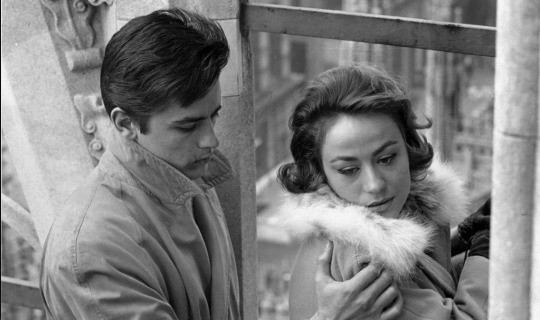


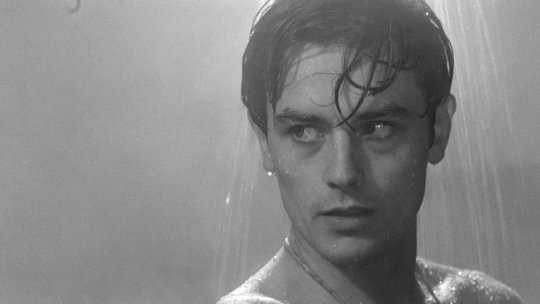
Recently watched: Italian art cinema virtuoso Luchino Visconti’s epic (177-minute!) tragedy Rocco and His Brothers (1960). In his review, critic Roger Ebert summarizes Rocco and His Brothers as “operatic” and “homoerotic” – both descriptions are apt! What greater recommendation is there? Led by widowed matriarch Rosaria, the Parondi family relocates from grinding poverty in the rural south to urban industrialized north (in this case, Milano) in search of better prospects. Instead, all they find is relentless catastrophe. Like his contemporary Pier Paolo Pasolini, Visconti had a superior “queer eye” when it came to casting handsome male actors. All five Parondi brothers are stone cold stunners – particularly beauteous young Alain Delon as Rocco. (We get ample opportunity to ogle the brothers wearing the de rigueur Italian neo-realism “wife beater” vests, sparring in the boxing ring and showering). But arguably, the film is dominated by Annie Girardot as local prostitute Nadia, the Parondis’ new neighbour. Encountering the glamorous, sensual and insouciant Nadia throws a hand grenade into the family’s life, with both Simone (Renato Salvatori) and Rocco falling hopelessly in love with her. Inevitably, heartbreak and death ensue. (As someone laments towards the end, “Christ will regret the suffering visited upon us!”). Perhaps understandably, Rosaria is prone to glancing skyward despairingly and calling Nadia a “putana.” (This archetypal black-clad Italian mamma is actually played by volatile Greek actress Katina Paxinou. And Delon and Girardot are, of course, French actors playing Italian characters – and dubbed by Italian voices. Watch also for gorgeous young starlet Claudia Cardinale in a supporting role). I’m embarrassed to admit I wasn’t very au fait with Annie Girardot (1931 – 2011) but judging by her heart-wrenching performance here she was every bit the equal of other iconic European art cinema actresses like Jeanne Moreau, Anna Magnani and Monica Vitti.
#rocco and his brothers#luchino visconti#annie girardot#european art cinema#alain delon#italian cinema
46 notes
·
View notes
Text
Jack Jeanne Playthrough Part 3 (April 5)

1 month later. April 5th in the VN. Kisa is at Univeil and excited she passed the entrance exam. She runs into her childhood friend Yonaga who's also been accepted. He's shocked that Kisa is attending too, but before she can explain Suzu joins them, introduces one each other.
Quartz's theme is "transparency" where many inexperienced performers who haven't specialized yet tend to go.
Onyx = Jacks whose forte is in dance.
Rhodonite = Jeannes who specialize in song.
Amber is where talented and unique students gather.
Suzu theorizes Kisa would be in Rhodonite because of her appearance, himself in Onyx because his physical abilities make him more suitable for dancing than singing or acting. Yonaga would like to be in Quartz.
Yonaga: Quartz...would be nice.
Suzu: I get what you mean!
Yonaga: Huh?
Suzu: Tbh I enrolled in Univeil cause I really admire Tachibana Tsuki, the legendary Jackace of Quartz!
Kisa: ...!
Suzu: That's why I wanna be in the same class as Tachibana Tsuki...come to think of it, your last names are the same.
Kisa: (If people find out I'm related to Tsuki-nii, it might make it even easier for them to discover my identity...! But it might be better than lying poorly...)
Kisa: It's true. It's the same (nonchalantly)
Yonaga: ......
Suzu: Maybe you guys are distant relatives!
Kisa: *nervous laughter*

Yonaga cuts in and says they should go check which class they're in. Kisa thanks Yonaga for the save. Their year is the 78th class of Univeil. All 3 are in Quartz.
Kisa gets called to the headmaster's office.
Chuuza congratulates her and informs her about her admission. The only ones who know that Kisa is a girl is him, Quartz's homeroom teacher Enishi Rokurou, and now Yonaga, Kisa's childhood friend. Chuuza is surprised that someone who knew about Kisa enrolled in the school.
But if anyone else finds out that she's a girl, expulsion. But since a lot of students are feminine, she won't have to go out of her way to act and dress like a boy. He reminds her to build trust with the rest of the students, and aim to become a lead and aim for the top.
Kisa arrives to Quartz's homeroom late.

??: Yes, yes, come right in.
Kisa: (The teacher...? But he's in a student uniform.)
??: You were called in quite loudly during the school announcements. Did you run into any issues on the first day? Theft, robbery, manslaughter, extortion, coercion, or a bank robbery, perhaps...?
(Please watch the clip of this scene. Can you tell he and Furuta share the same VA? 😄)

Fumi: No one like that would be in our school, Kuro.
??: But wouldn't be great to have such a plucky 1st year around, Fuumin! All the world's a stage!
Fumi: And, if the cops came?
??: I concede! Law is what keeps society together.
Kai: ...you two are bothering the 1st years.
Kisa finds a seat by Suzu and Yonaga.
Neji Kokuto (3rd year, 76th class of Univeil) welcomes the 1st year students to Univeil and Quartz. Class leader-slash-scriptwriter-slash-director-slash...all kinds of other things! He provides an info-dump about Univeil for us.
5 performances in total: Rookie, Summer, Fall, Winter, and Univeil Exhibitions. The Rookie Exhibition is where the 1st years take the lead roles, which is going to be held May 30th. Today is April 5th, so less than 2 months remain. Most viewers will watch over them warmly, but others will be more strict, like journal reporters, critics and avid Univeil fans. Neji will write a script to allow even novices like them to shine on stage. Casting will be announced mid-April. Upper years are also participating and support the 1st years.
Neji: If you have any questions, all you need is to ask. I'm sure all our seniors here will be more than happy to help you.
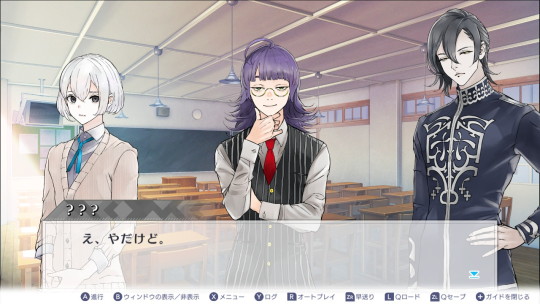
??: What, no way.
Neji: With some exceptions of course! Mwahaha. Mikki's a 2nd year now, you can be a little nice to your juniors, hm?
??: ...
Kisa notes he looks cute like a doll. Shirota Mitsuki, noted for his singing. He catches Kisa staring at him, and she apologizes.

Neji asks if anyone has any questions. You're given 3 options: 1) How casting is determined, 2) Type of training to be done, 3) No questions.
Casting is based on Neji's subjective judgment. Everything from how they're doing in lessons, campus life, the way they walk, talk, physique, voice, facial expressions. Essentially based on his intuition, which he uses to find gemstones in the rough.
Training I'll explain later, there's gameplay related to it.
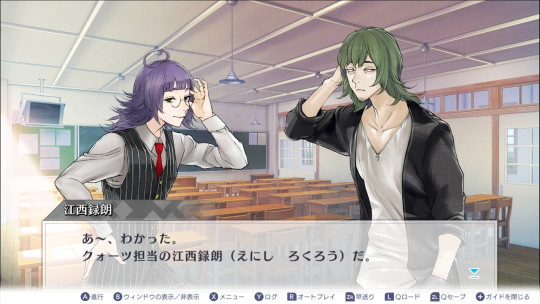
Neji finishes his spiel and passes it on to Quartz's homeroom teacher, Enishi. Pretty low energy. Lessons start tomorrow. Class is dismissed.
Suzu meets Kisa outside the Quartz dorms and asks if she's ready to introduce herself to the other students. He notes it's hard to find people since Univeil is so large. They chat for a bit, Suzu asks Kisa to call him by his first name, so Suzu-kun it is.

Inside Yonaga's dorm. He's finished unpacking, though he's still yet to put away his books (on theatre). He asks how Kisa got into Univeil, and she explains what happened. Yonaga says he'll help Kisa to make sure she stays at Univeil. He's glad that Kisa is here with him.
Yonaga: Kisa-chan, about Tsuki-kun...
Kisa: I can't get in touch with Tsuki-nii, but I'm sure he's doing fine wherever he is.
Yonaga: I see. Yeah, I'm sure he is.
(Isn't that sketchy? Maybe he turned into that weasel with the moon on its belly lol)
Kisa begins her search for the Quartz students. At the Univeil courtyard, Kisa hears Mitsuki singing.

"Within this chest of mine I dance, the rhythm of possibilities"
Kisa: (I'd heard he was lauded for his singing, but he really has a beautiful voice...the lyrics paint the scene in my head.)
Mitsuki: ...could you not stare at me like that? It's uncomfortable.
Kisa: Oh, I'm sorry!
Mitsuki: Oh, you again. The 1st year who came in late.
Kisa: Yes. My name is Tachibana Kisa. It's a pleasure to meet you.
Mitsuki: Huh...you've got a face like a girl.
Kisa: Eh? Y-yes, I suppose so.
Mitsuki: A high-pitch voice. A delicate figure. And a Jeanne at that. At least be aware of your own features.
Kisa: I-I'm sorry.
He sighs and introduces himself. 2nd year, 77th class of Univeil. A Jeanne and a tresor (songstress/diva) of Quartz. VA is Kajiwara Gakuto (Asta). Kisa compliments him on his singing.
Mitsuki: So you were eavesdropping.
Kisa: I-I'm sorry.
Mitsuki: Well, not like I care either way. Later.
Kisa: He left...I guess he doesn't really like interacting with people. But his voice really was beautiful.
(If I had to describe Mitsuki's tone, it would be similar to Kenma, but a bit more antisocial lol)
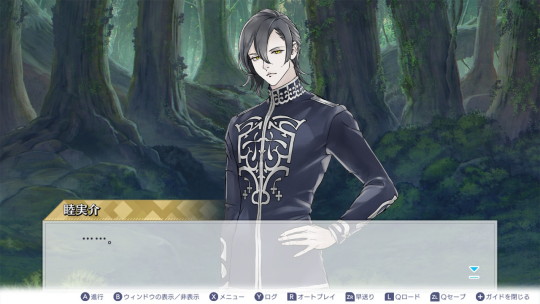
Kisa finds Kai in the forest, seemingly concentrating on something. She decides to come back later, but Kai notices her.
Kai: ...? Quartz's 1st year?
Kisa: Yes! I'm Tachibana Kisa.
Kai: I see, you're...
Kisa: Yes!
(awkward silence between the two)
Kai: Mutsumi Kai, 76th class of Univeil. I'm a 3rd year.
Kisa: So I should call you Mutsumi-senpai!
Kai: Kai is fine. You can call me that around other people too.
Kisa: But...
Kai: ...
Kisa: ...(agrees)
Kai: ...
Kisa: T-then, I'll call you Kai-san!
Kai: Okay.
Kisa notes Kai is the Jackace of Quartz. And since Tsuki was also the Jackace, that means he must be talented too.
Kai: I'm a vessel meant to garnish the Aljeanne. Nothing more, nothing less.
Kisa is confused by his statement. Convo ends.

Kisa runs into Neji next in the hallways. He enters a room then promptly comes back out.
Neji: Welcome!
Kisa: Ah!
Neji: What're you doing in a place like this?
Kisa: I'm going around introducing myself to everyone in Quartz.

Neji invites her into his workroom where he writes his scripts and plans his staging. But he also performs on stage, any male or female role, from a shining prince/princess to old grannies/gramps.
He's currently working on the script for Quartz, but he won't reveal it just yet. Kisa asks if the other class leaders write the scripts like he does, but Neji is a special case, who screenwrites, directs and performs.
Neji: Once you get carried away, you can't see what's going on around you. What we do has no end to it. Acting, dancing, singing, they're fields that you can pursue for a lifetime. You could reach the stars, or merely end up as a master of none. No matter how much time, it will never be enough. It's a terrifying world out there. That's why it's so engrossing. The stage is a colossal device. The Jacks and Jeannes make up the gears, and I am the craftsman who pieces them together. Let's create a fantastic stage together, Tachibana-kun!
Neji must continue writing, and wishes Kisa the best for the Rookie Exhibition. (Neji definitely talks the most out of the main cast lol. And fast too, talks a mile a minute and tone varies hugely)

Kisa finds Fumi standing languidly in the middle of the dance room, taking deep breaths before beginning to dance. A Japanese-style dance where his movements are gentle, beautiful and brilliant. He comments on Kisa staring intently at him, just like during the entrance exam.
Kisa is surprised that Fumi remembered, despite the number of applicants.
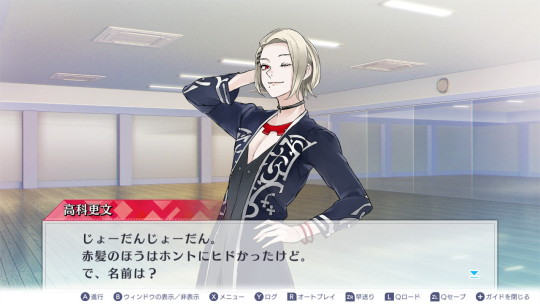
Fumi: I remember you and the red-haired guy well cause you two danced so terribly.
Kisa: Oh...
Fumi: I'm just kidding. Though the red-haired guy really did suck.
Kisa introduces herself, and Fumi pauses at hearing the name Tachibana. 3rd year Takashina Sarafumi, 76th class of Univeil, but he prefers being called Fumi, no senpai honorific attached. Kisa ends up calling him Fumi-san.
Fumi: Let's have fun, Kisa. (leaves)
Kisa: It's overwhelming seeing him up close. So that's the power of an Aljeanne.
Kisa goes to her room excited for her new life at Univeil and retires for the night for her 1st day of classes tomorrow.
***
previous || next (to be updated)
42 notes
·
View notes
Text
Summer 2021 Anime Season
What I’m Watching:
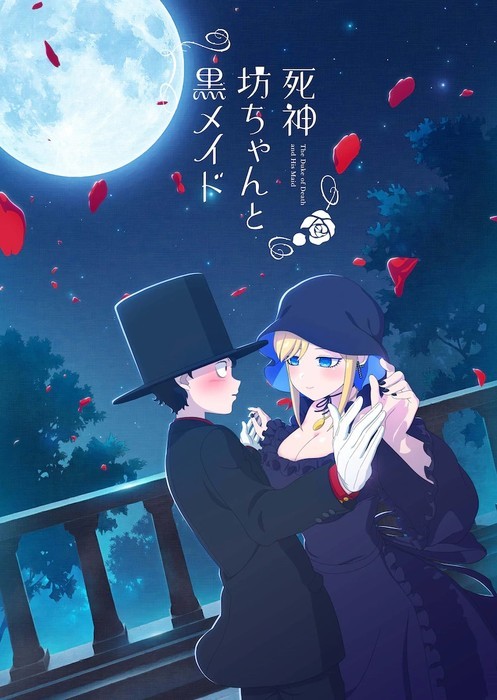
Shinigami Bocchan to Kuro Maid is one of the cutest, sweetest series I’ve seen in a while. The plot sounds rather dark, following a young duke who has been cursed by a witch so that anything he touches, from plants to animals to people, will die. Touching through clothes has the same effect. This naturally isolates him, to the point that his own family have shunned him and he’s forced to live in a separate home out in the woods, with only two servants who are kind (or crazy) enough to stay with him despite the danger. One is an elderly butler who takes on a fatherly role, and the other is the beautiful, busty maid named Alice. And this is where a show that could have gone really dark brightens up to an adorable romantic comedy. Alice is not the least bit afraid of the duke’s curse, and her teasing, cheerful disposition practically forces him to open up. Speaking of Alice, I really enjoy the way her character is handled. Just as the show could have gone dark, it also could have gone sexist and gross. Alice is very busty, as I mentioned, and the show does have some fanservice, but the WAY this fanservice is done makes all the difference. Alice is a flirty character who always seems to be an enthusiastic participant in whatever fanservice we see, rather than being an object to be leered at. She’s very much in control of her body and her sexuality, which I appreciated. Also, there’s a lot of restraint on display here. There are so many ways they could have ruined this by going too far, but they didn’t. The fanservice is restricted to some cleavage shots and Alice occasionally flipping up her own dress to display her stockings. It comes across more as “sexy fun times” than “male gaze oggling a woman”. Because Alice is an interesting and well-written character in her own right. On the surface, she’s unflappable, facing a dire situation with limitless patience and optimism. But we get a few small, brief glimpses of the emotional toll it all takes on her, which is refreshing. The duke himself is a fun character, forever flustered by Alice’s antics but clearly not wanting her to stop. There are some amusing side characters as well. The animation has been criticized quite a bit, as it’s CG. It’s not the best looking CG animation I’ve seen, but it’s far from the worst. For a simple, cute show like this, it’s fine. Recommended if you like romantic comedies with a somewhat dark setup.
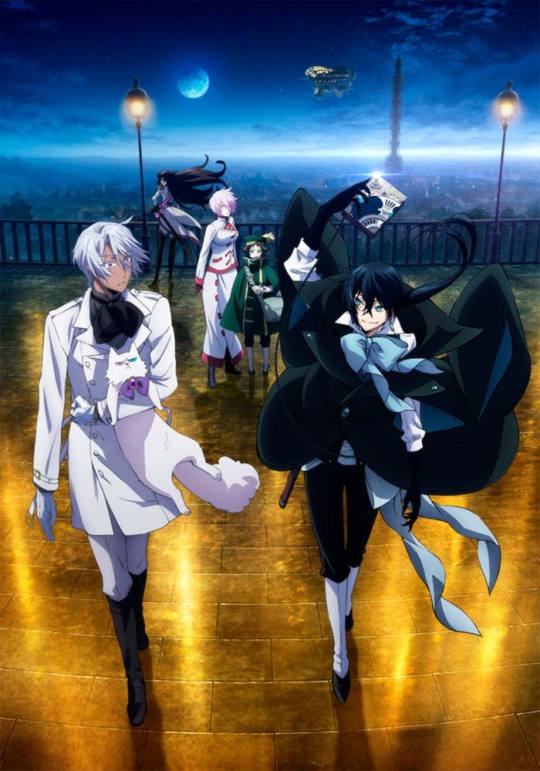
Vanitas no Carte is based on a manga by the woman who did Pandora Hearts, so you have some basic idea of what you’re getting into: extravagant period costumes, gothic European scenery, dark and violent themes mixed with goofy humor, and a very complicated web of character relationships. This series features a vampire society that’s being plagued by “curses” which turn the vampires into mindless beasts that can only be saved by mercy killing them. That is, until a human named Vanitas shows up with the power to cure the “curse bearers” using a legendary book that most vampires doubted the existence of. He teams up with Noe, a kind and naive yet physically very strong vampire who has been tasked with finding said book and determining whether its power is real. The result is a bizarre buddy comedy with touches of gruesome violence and gorgeous art. Of the two protagonists, Noe is my favorite. He’s sweet and good-natured, naive but not stupid. He has a disturbing back story (as most of the characters do) but he can still look at the world with excitement and wonder. He also has a hilarious and adorable cat named Murr. Vanitas, on the other hand, is an insufferable asshole. And I don’t mean in the fun way. I mean he literally makes the show hard to watch when he’s onscreen. I normally like the smug bastard types in anime, but Vanitas really pushes the limits of my tolerance. In an early episode he forces a very deep, very long kiss on a woman he has rendered immobile and unable to defend herself, groping her all the while. I found the scene very troubling, and was even more troubled when I read the comments on the episode, almost all of which calling the kiss “sexy” or “hot” or, worst of all, “romantic”. It’s extremely obvious that the woman did not want or enjoy the kiss, but aw, she was all blushy and embarrassed afterward, so it was a cute scene, right? Ugh, no, gross. The woman, named Jeanne, was established as a very powerful, badass vampire. Yet she’s quickly reduced to a red-faced, crying mess by this absolute garbage character sexually assaulting her in front of several other characters. The whole scene was so bothersome I almost dropped the series entirely, because Vanitas never faces any consequences for this act. He just grins smugly after it’s over. However, I kept watching because, aside from Vanitas, the show is amazing. The art and animation are breathtaking. The plot is highly interesting. The characters, Vanitas excluded, are compelling. And then we have Noe, who is pretty much the opposite of Vanitas. Honestly, if Vanitas was the only protagonist, I would have dropped it, but he’s one of two. So... recommended, but with caution. Your mileage may vary on how much Vanitas you can stomach.

Heion Sedai no Idaten-tachi is.,. not something I expected to enjoy. It has a visual style that reminds me of Kill la Kill, a show I absolutely loathed. The overall vibe of the show is a little off-putting for me, but somehow I got myself hooked on it. The basic set up is that, hundreds of years ago, giant monstrous demons roamed the earth. All the gods of the earth got together, defeated the demons, and sealed them away, leaving one young god named Rin behind to watch over the seal and train newly born gods to fight, should the seal ever be broken. Flash forward to the present day, where Rin has only been able to train a very small number of gods because most of them can’t handle Rin’s absolutely brutal training (it mostly consists of her murdering them over and over and letting them regenerate, as they’re essentially immortal). Unfortunately, some demons have come back, and they’ve taken the appearance of humans. This revelation motivates some of the younger gods to resume their training with Rin. And that’s about all I can say for the plot without getting into some bizarre subplots. There’s a lot I don’t like about the show. I’m not crazy about its cartoony look given the subject matter. I don’t like that there’s basically a whole subplot that revolves around human women being repeatedly raped (side note: rape is never graphically shown, though it is made extremely clear what is happening and we see the lead up to it, also this is a rather small subplot that gets little attention after the first episode). And I absolutely hate that a character involved in this subplot, who encourages it, is presented as a character we should actually like. But! There are some things I really enjoy about it as well. I think the setup is really cool. The gods, and their role in the world of the story, are super interesting. They’re practically indifferent to humans, not even taking the slightest bit of interest when one country invades another and slaughters innocent civilians, because to them, it’s like a human intervening when one animal fights and kills another in the woods. So long as humans aren’t completely wiped out, they don’t get involved. Which is a neat concept. I also like the battles, which are frenetic and a blast to watch. And I totally love Rin, who is just a straight up badass in every single way. She’s one of those ridiculously overpowered characters we sometimes get in anime, most of which are usually male. Rin is so absurdly powerful that other absurdly powerful characters are terrified of her to the point that the mere mention of her name triggers panic attacks. Watching her fight is pure joy. Also the music is great, with an absolute banger of an opening theme. Recommended if you like wild, imaginative action anime and aren’t triggered by rape.
Carry Over Shows From Previous Seasons:
To Your Eternity
Boku no Hero Academia
Shaman King
Best of Season:
Best New Show: Shinigami Bocchan to Kuro Maid
Best Opening Theme: Heion Sedai no Idaten-tachi
Best Ending Theme: Vanitas no Carte
Best New Male Character: Noe (Vanitas no Carte)
Best New Female Character: Alice (Shinigami Bocchan to Kuro Maid)
#Anime#Anime Reviews#Anime Recommendations#Summer 2021 Anime#Seasonal Anime#Text#tw: rape#Shinigami Bocchan to Kuro Maid#The Duke of Death and his Maid#Heion Sedai no Idaten-tachi#Not tagging Vanitas because I talked shit about the character lol#This is the smallest number of shows I've followed in a long time#Maybe I'm getting more picky
7 notes
·
View notes
Text
(It’s been a while since i had not translated anything so here’s a new Noémie interview ! Thank you to the discord for sharing the full article !)
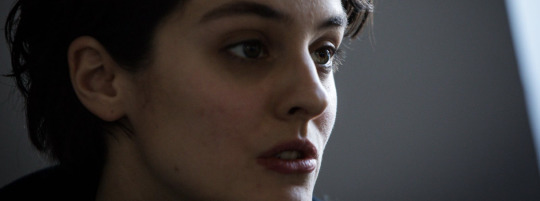
Noémie Merlant: “When something disturbs, it stirs up important and useful things.”
She starred in Céline Sciamma's Portrait of a Lady on Fire at the latest Cannes Film Festival, now she presents "Jumbo" at LuxFilmFest: a meeting with Noémie Merlant, an actress we will hear a lot more in the future - and for good reasons.
8 March: Women's Day or Lazy Day?
Women's Day!
Women in movies?
More, more, more...and more.
Eat what you like first or leave it to the end?
I eat all of it in one go - and what I prefer right away.
Shooting with a male or female director ?
Both.
A difference in sensibilities?
Of course, because we all have a different relationship to the world because we have a different story, a different background... And even between women, there are different sensitivities.
Joining the Sciamma/Haenel complicity on Portrait of a Lady on Fire.
A joy, an opening! They were both immediately determined to make sure they would be able to include everyone in a fluid circle where everyone had their place and to create a space for expressing themselves.
The deciding factor for the choice of a role?
The story, the script, if I feel emotions, an artistic promise, a point of view and vision. If it's an object or subject role - if it's a subject I go for it. And who is the director, who are the people who are working on it...
How to prepare for a role?
It's really specific to each role. Some people prepare more than others, and some prepare differently. But it's a phase that I love because everything is possible and everything can be designed and built. This is what makes possible to have a kind of framework - and the more prepared it is, the more freedom you have afterwards.
Staying in a character off-camera.
I stay more or less in character - even if I don't want to. It's more tiring to disconnect than it's to stay within the tension of the character.
The director you would like to work with for you next film?
Bong Joon-ho, I love his films so much!
To embody a sympathetic or disturbing character?
I like disturbing characters who take us out of our comfort zone, who take us on a journey. When something disturbs, it stirs up important and useful things.
To put yourself in danger, do things that scare you.
I don't like the feeling of fear. For Jumbo, I was more afraid of the ride than I was of Jeanne's complex role, which is a real challenge - an important and beautiful one. There was a fear of not being up to the task. But that's precisely when it's necessary to do it in order to take the audience to another place.
Afraid of amusement rides?
Even if it's short, rides are a nightmare! But in the end, "Jumbo" has reconciled me with a lot of people. of things.
How can we make this Jeanne accessible to the viewer?
To understand this love story, we must not judge it. We must not look at Jeanne as a curious beast, but to be with her and to feel her emotions. And you can feel this when you see the object come to life and see the real interaction between the two of them. So I put back all the steps of a real love story in there. I was also talking to Jumbo, I confessed my fear of doing this ride. During that last ride, I completely let go - and then I thanked him, which created the start of our relationship.
Jeanne, the girl, loves Jumbo, the amusement ride.
She struggles with relationships, but this object is neutral and a bit of a mirror of herself.
To explain you choice of roles to your loved ones and friends.
I'm here, I don't say too much and I can't wait for them to discover the film.
The first viewing of the film?
Usually I see it first with the crew - and it's always hard the first time because you look at their work. Like a lot of actors I'm very focused on the work I've done. It's at the second viewing that I look at the film as a whole with detachment - and where I enjoy watching it.
With time, are you more critical or more conciliatory about your work?
More conciliatory, because I no longer look at my work, but at the film. At some point, you have to know how to detach yourself...
Perfectionist or not?
I have an eye for detail. I like it when it's imperfect, when there are accidents. And I especially like the multitude of possibilities, I want to know all that is possible and therefore I will tend to go on and on and on and on...
To get behind the camera.
That's what I'm doing at the moment and I love it! It's another way of expressing yourself that you can't do in front of the camera. It also allows you to discover yourself deeply and in another way.
Shakira and Mi Iubita - filming with the Roma community and the power of cinema to give a voice to those we don't hear often.
There is some of that, but also a real attachment to people I know from this community. To show a way of living and to see the world that moves me a lot. They have this notion of freedom, and at the same time they are pushed aside from society - and despite that they still find a rather crazy freedom, they are in the present, in acts of courage, of tenderness.
A project without a big budget, a kind of freedom?
Yes, and it was also specific to that community, who is always in that kind of urgency and freedom: that and the "resourcefulness" side of the project - serve the purpose of it.
Are you more of a sedentary or a travelling soul?
I'm more a traveller, I move around a lot.
The importance of festivals?
Especially for films that don't have a lot of visibility at the outset, they are essential.
Cannes Film Festival, LuxFilmFest?
They're all important, it's not the size that matters. What matters is the beating heart of the festival and the love of cinema.
Red carpet: obligation or pleasure?
Rather obligation, but once you're there, there's always a pleasure to be with your team.
What is the importance of this family atmosphere in cinema?
For me it's essential - especially with this artist life, where you go from family to family.
How do you relax?
Dancing! It's the best way for me to clear my mind.
Your favorite author?
I love George Sand.
- Interview made by Vesna Andonovic for the Luxemburger Worst -
#noémie merlant#portrait of a lady on fire#portrait de la jeune fille en feu#jumbo#sometimes i translate things
122 notes
·
View notes
Text
Isabelle Huppert: The Most Dangerous Actress in European Cinema
Etre actrice, c’est avant tout faire l’apprentissage de sa liberté.
- Isabelle Huppert
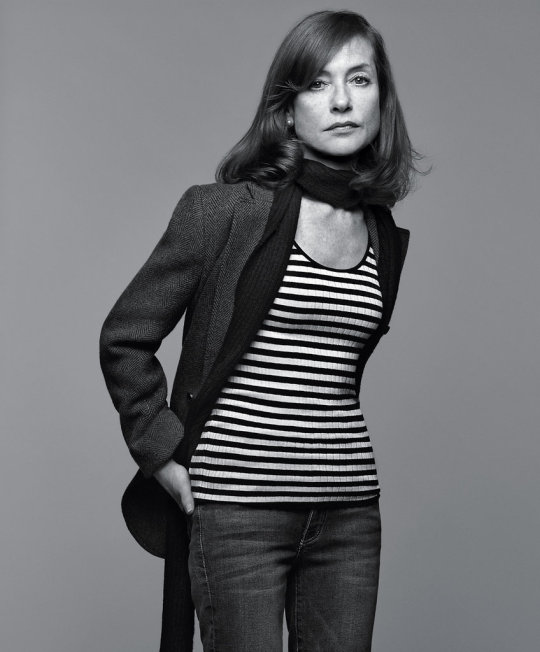
At 66 years old, Isabelle Huppert has had a long, celebrated career and is regarded in the highest echelon of French actors. Among actresses, Isabelle Huppert holds the record for César Award nominations (France’s Oscar award), with a whopping sixteen. She has also had twenty of her films in competition at Cannes, more than any other actress. And she is among just four actresses who have won the Best Actress prize at Cannes twice.
Not a bad track record.
Though she has appeared in a few American productions over the years, including “Heaven’s Gate” (1980), “The Bedroom Window” (1987) and “I Heart Huckabees” (2004), her best films have all been European.
Extraordinary women marked by tragedy and surrounded by mystery — these are Huppert's trademark cinematic roles. The films of Isabelle Huppert tend to be filled with sociopaths, self-mutilators, and murderers.
There was the jealous postmaster in “La Cérémonie,” the gun-toting young bride in “Coup de Torchon,” and the prostitute who poisons her family in “Violette Nozière. “The Piano Teacher,” “Elle” and “Greta” would make a crazy triple feature. Overall Isabelle Huppert, one of the iconic dames of French cinema, has garnered a reputation for being cold and steely. The French actress, now in her mid-60s, consistently chooses roles that are morally complex and sometimes hard to watch. And yet we can’t bring ourselves to look away.
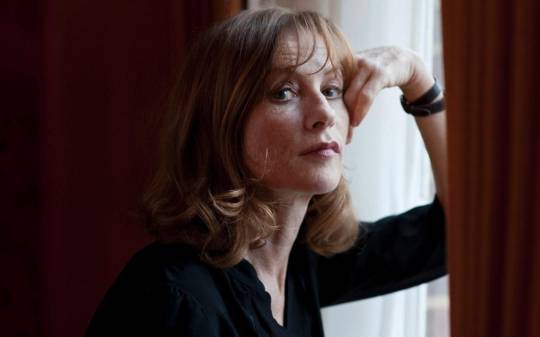
Susan Sontag, who once called Huppert “a total artist,” said she had never met “an actor more intelligent, or a person more intelligent among actors.”
Huppert has been called France’s Meryl Streep for her technical skill, but for all her shape-shifting, Streep’s strongest women have never gone so dark as the roles Huppert has played.
Huppert expresses the moods and mental state of her characters with precision and great sensitivity. Her seemingly expressionless face and sparing facial expressions have become something of a trademark.
Fiction has a tendency to inflate things, she said once in an interview with The Financial Times in July 2017. "But when I look at people on the street, I find that most of them are pretty empty in their eyes. I have to do even less." To observe, she has been taught, you have to take away, not add something.
Isabelle was the youngest of five children, born in Paris to an engineer father and a mother who taught English. Her mother is credited with spotting her talent early on, and encouraging her to develop it. She was already well on her way as a teenager, getting acting jobs while studying at the National Conservatory of Dramatic Art in Paris.
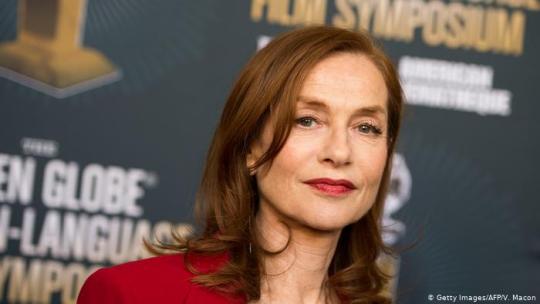
Huppert’s résumé is remarkable over five decades: Just over 140 films since her debut in 1972, for many of cinema’s most audacious visionaries, including Claude Chabrol, Claire Denis, Curtis Hanson, Hal Hartley and François Ozon.
In “Things to Come,” a wistful, funny drama by the French director Mia Hansen-Love. She plays Nathalie, a Parisian philosophy teacher whose husband leaves her for a younger woman, whose mother dies, whose publisher won’t reissue her book — and yet, who finds unexpected freedom in all of these losses. Nathalie heads toward the light and Michèle toward the dark, but both roles showcase Huppert’s great ability to derive power from vulnerability.
What directors loved about Huppert — and she prides herself on being an auteur’s actor — was her ability to convey moral complexity in the most unique ways.
Working with such auteur directors, Huppert can inhabit extreme characters — "survivors who can be victims and rebels simultaneously," says the actress. "My films give these women a voice. Because even though they live on the edges of society, they are there: women who live brutal lives. It's a brutality that they themselves never sought out," Huppert told Zeit Magazine.
Paul Verhoeven who directed her in “Elle” described Huppert as a “pure Brechtian actor,” in that she puts distance between herself and the audience, without trying to seduce it or seek its sympathy.
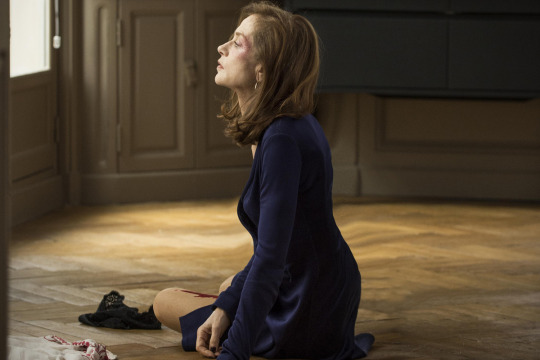
The actress is notorious for her illegibility - her almost Bressonian lack of expression, and the profound unrest she’s able to convey from behind the stillness of her freckled resting face. Pauline Kael, the famous film critic, once complained that “when [Huppert] has an orgasm, it barely ruffles her blank surface.” If Kael had lived to see “Abuse of Weakness,” “Elle,” or “I Heart Huckabees,” perhaps she would have come to appreciate how the stillness of Huppert’s unbeatable poker face allows her to normalize even the strangest and most perverse of characters; to make it seem as though any of their behaviors, no matter how unusual or demented, are as natural to them as we are to ourselves.
It’s a quality that European directors and audiences have embraced, but which can seem more foreign to Americans. Huppert loves American cinema, but she also knows her sensibility is distinctly French.
Huppert is known for her privacy and reserve - she generally doesn’t talk to the press about anything other than her films - and if there’s a connection between her autobiography and the roles she chooses, that’s something that only she knows.
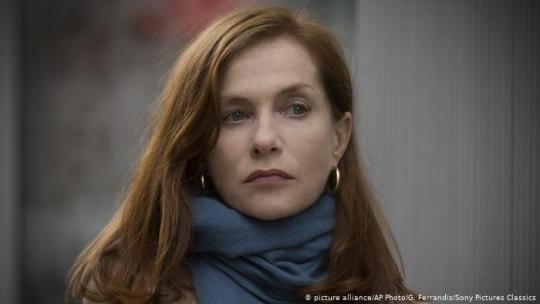
Aware of her own enigmatic appeal, she has no qualms about exploiting it. She has even less desire to charm, although her formidable impassivity sometimes betrays a hint of vulnerability. Not that she will let the viewer get too close, however, as she is forever intent on remaining “more like a question mark than a statement”.
Isabelle Huppert is not just courageous when it comes to choosing film roles and artistic collaborators. She is fearless, and such is her integrity that we trust her instincts and follow wherever she leads. That’s what makes her the most dangerous actress of our time.
Below is a top ten list of Isabelle Huppert films. They are not in order nor are they her very best. There are simply too many films in her body of work that would deserve equal consideration. Instead the list is made up of films that given an introduction to her wide ranging talents.
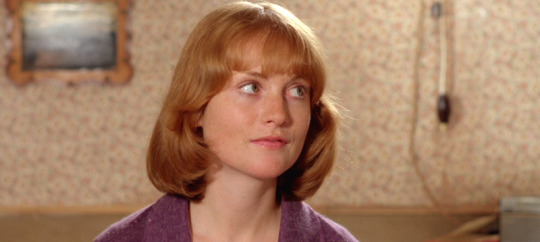
1. The Lace Maker 1977
Isabelle Huppert won the most promising newcomer award for her graceful, guileless performance as Pomme in Claude Goretta’s masterly adaptation of a Pascal Lainé novel, which took its title from a Vermeer painting. Whether doing her chores at a Parisian beauty salon, playing blindman’s buff on a Cabourg clifftop with dashing Sorbonne student Yves Beneyton, trying to eat an apple without disturbing his reading or choking over dinner with his snooty parents, Huppert is mesmerising.
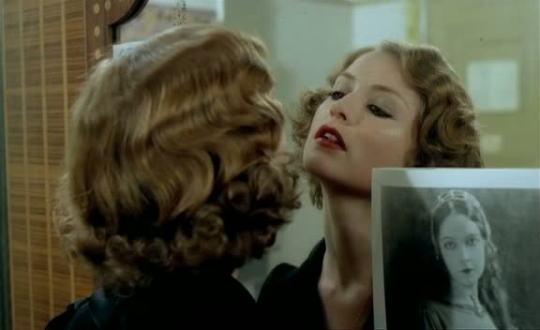
2. Violette Nozière 1978
The first of her seven collaborations with Claude Chabrol earned Huppert the best actress prize at Cannes. She was 25 when she played the demure schoolgirl who shocked 1930s Paris when details of her double life as a prostitute emerged following the poisoning of her father. Violette claimed he had abused her, but Chabrol thinks otherwise and exploits Huppert’s genius for switching between fragility and cruelty to counter the surrealist myth that the teenage parricide was an anti-bourgeois icon.
Huppert embodies this character that’s chiefly concerned with finding love. She walks the streets at night, characteristically promiscuous, but don’t call her a prostitute. She’d refute. Throughout the film, she gives more money to the men then vice versa. At night, when she leaves her quiet bourgeois home, and finds a man to accompany her, she looks unusually bothered. The film is sometimes maddeningly ambiguous but perhaps that’s the point - Chabrol and Huppert want us to feel mixed about her.
Violette is a woman with an air of mystery around her. She’s precocious but not as clever as she thinks. Huppert gazes and kisses her own mirror reflection. She writes fictional love letters to herself as well. Huppert quietly stresses the motivation behind the character: desperate to find someone to love, or else she’ll have to love herself. Except, she can’t even love herself because she feels stifled by her home life. And as ever with narcissism, there are dangerous consequences.
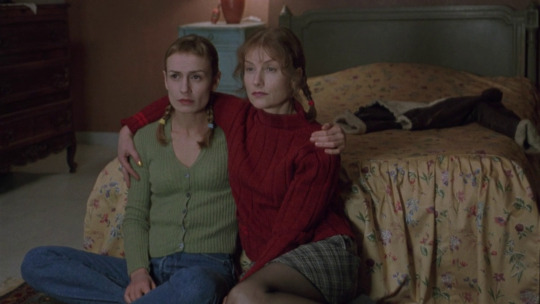
3. La Cérémonie 1995
“Chabrol only ever cast me as fairly ordinary characters,” Huppert once revealed. “They just have rather particular destinies.” While she would go on to embody Chabrolian womanhood (“not victims, not fighters, somewhere in between”) in Rien ne va plus (1997), Merci pour le chocolat (2000) and Comedy of Power (2006), she gave her finest performance for him in this seething adaptation of Ruth Rendell’s A Judgement in Stone.
An upper-class family warns their meek maid (Sandrine Bonnaire) about the local mail lady, Jeanne (Isabelle Huppert). They become friends regardless. Huppert plays Jeanne as kooky, comic, and rebellious. We gradually find out more cryptic background on her character, which gives her spirited attitude a darker edge. She’s either heartbroken or heartless. Huppert portrays a character with so many contradictory traits without ever making it feel false.
Huppert performs the role cunningly. Jeanne is energised like a child, but she’s smart enough to know how to win over the maid. She’s a little silly - when she enters the family’s home while they’re away, she touches everything. Huppert balances all of this next to the near-mute Bonnaire, both slowly exacting their revenge against the upper class. Chabrol’s trademark: clash of the classes.
Huppert thoroughly deserved her first César.
In 2014, Huppert performed Jean Genet’s play The Maids with Cate Blanchett. The play was inspired, as was La Cérémonie, on the same true-story about the Papin sisters.
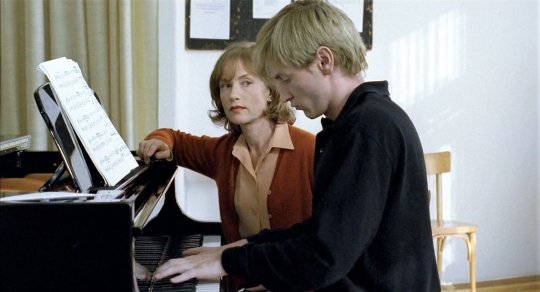
4. The Piano Teacher 2001
The Piano Teacher is an elegantly made film about the deranged endeavors of love. Huppert plays a buttoned-up music instructor, Erika, who attracts the eyes of an unassuming man half her age. She still lives with her mother and there’s a danger that lurks behind her carefully placed gaze. She’s been sexually repressed for such a long time; her repression and self-hatred has slowly evolved into masochism. It drives her to haunt peep shows, spy on copulating couples and mutilate her own genitals. This disturbing film really made an impact world wide.
Nobody said this film was an easy watch!
Haneke gives the spectator all the intricacies of the concept of perversion inserted in Huppert’s character of Erika, a successful piano teacher and an apparently impeccable social life. Well, that’s what Erika keeps on the surface.
Huppert declared the second of her four collaborations with Haneke to be the film she had long been searching for.
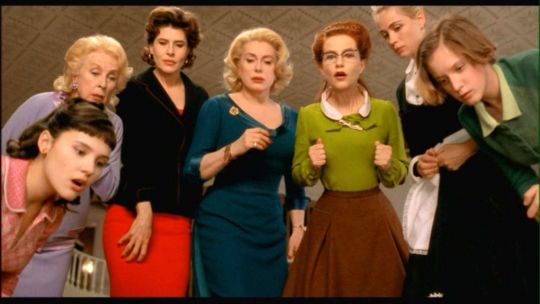
5. 8 Women 2002
There’s no validity in the truism that Huppert doesn’t do comedy. In fact she proved she could both dance and sing (the plaintive ‘Message personnel’ is a career highlight) in François Ozon’s chic 1950s musical whodunit. Sporting a tight bun, a buttoned-up twin-set, pursed red lips and butterfly spectacles, Huppert invokes the spirit of legendary farceur Louis de Funès as Catherine Deneuve’s argumentative sister. She gives an indelible display of neurotic, spinsterly bitchiness that is simultaneously piteous and hilarious.
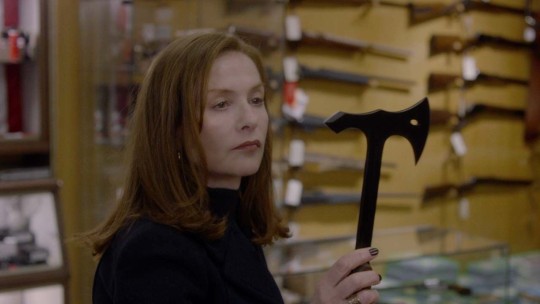
6. Elle 2016
A successful woman enters a real ordeal after being raped by a stranger in her home. Powerful, ‘Elle’ unravels all the nuances of a character’s life inserted into a completely incongruous personal, social and psychological reality. Here, the character will demonstrate how her attitude towards the world follows a sociopathic pattern of acting, despising any form of emotional attachment and using other individuals solely to satisfy her most primitive instincts. The film earned her an Oscar nod for Best Actress, which was fabulous but also made me wonder what took so long. Certainly she’s turned out enough superb performances over her nearly five decade career to have earned this recognition sooner.
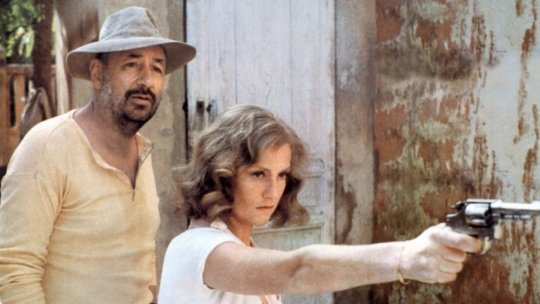
7. Coup de Torchon 1981
Having survived a seven-month stint in Montana for Michael Cimino’s Heaven’s Gate(1980), Huppert ventured to Saint-Louis in Senegal for Bertrand Tavernier’s Oscar-nominated transposition of Jim Thompson’s pulp novel, Pop. 1280, from a small Texan town in the 1910s to west Africa on the eve of the Second World War. Although Pierre-William Glenn’s sun-scorched Steadicam imagery seems antithetical, this is a darkly droll noir that sees Huppert in an unusually skittish mood, as the abused colonial wife who forges an unlikely alliance with Philippe Noiret’s pathetic rogue police chief, who is humiliated by everyone around him, and suddenly wants a clean slate in life - but resorts to drastic means to do so.
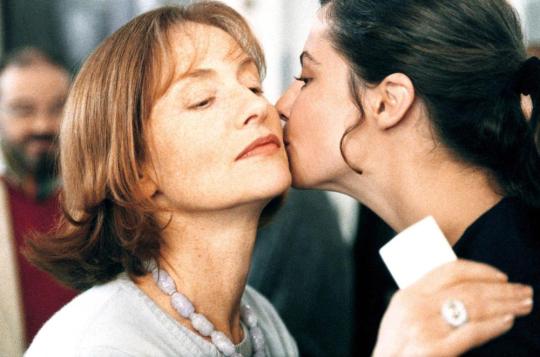
8. Merci pour le chocolat 2000
The film follows the nuances of a French upper class family, exploring the destructive ways in which each member acts on the world. Directed by Claude Chabrol, ‘Merci pour le Chocolat’ is an interesting film, bringing a more cadenced plot that values studying each meander of the behavior of its central characters.
The movie is set in Lausanne, and that Swiss location, having an ambient sense of buttoned-up severity and menace, is an appropriate setting with a Nabokovian mien for this horrid tale of sociopathy.
Huppert dominates the film with the slightly frigid poise of a great dancer who has retired to become an exacting teacher. She plays Mika, a woman who presides wearily and almost negligently over the prosperous chocolate business built up by her late father. But however disengaged she is in the boardroom, in the kitchen she loves chocolate with a passion - concocting various types of drinking chocolate, using subtly differing recipes, with fanatical and murderous care.
There is something fascinating about Huppert's face here. In repose, it has a kind of unsettling serenity, the serenity of a cunning and covert predator who has already decided on an unspeakable course of action.
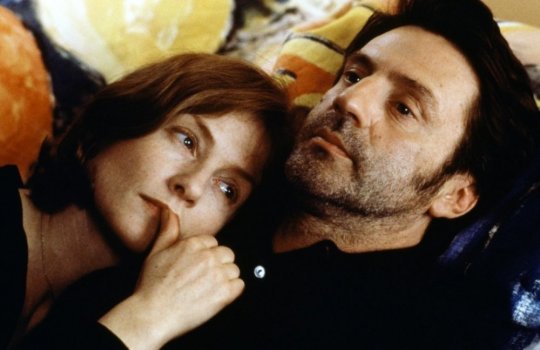
9. La Séparation 1994
Isabelle Huppert and Daniel Auteuil play a couple on the verge of a separation. The relationship’s mainstay is their child, one-year-old Loulou. Autueil gets most of the film’s focus, but he’s essentially a sitting duck, nervously shifting between passive-aggressive contempt and hopeful endearment, as he prepares for the outcome of his girlfriend’s infidelity. He says, “Never two without three.” This could be the quote-totem of the film.
The director smartly leaves the interloping lover out of the film (he’s never seen or even named). Instead, we study Auteuil’s growing impatience and Huppert’s pivotal decision. She adds a lot of depth to a character that could’ve just been the unsympathetic partner of the cuckold.
Huppert gives her character integrity and even though she’s ostensibly guilty, she never comes off as purely selfish. She’s troubled, as well, by their situation - we sense her detachment not due to ego but because she’s boggled in trying to assess the right mode of conduct. Huppert and Auteuil have great chemistry, changing gears effortlessly between vitriol and affection.
Huppert’s distinctive talent for suppressing suffering is readily evident in her slowly disintegrating relationship with Daniel Auteuil, as Huppert imparts chilling intimacy to a withdrawn hand, an unanswering gaze, a treacherous silence and a careless word in conveying the pain of falling out of love.
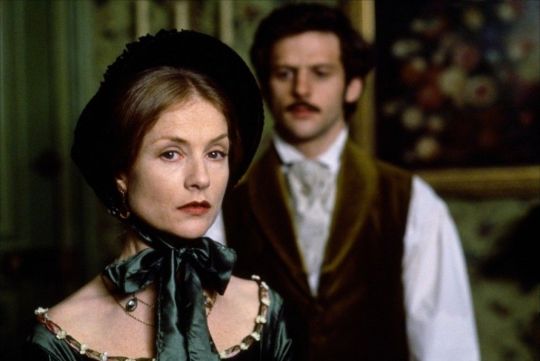
10. Madame Bovary 1991
Not her greatest film but certainly one of the most accessible for anyone not familiar with the talents of Huppert. Based on Gustave Flaubert’s fabulous novel, the film brings the exacerbated trajectory of a young girl who has a highly romanticised view of the world and craves beauty, wealth, passion, as well as high society. It is the disparity between these romantic ideals and the realities of her country life that drive most of the novel, leading her into two affairs and to accrue an insurmountable amount of debt that eventually leads to her suicide.
This adaptation of ‘Madame Bovary’ is perhaps the best of any adaptation to date. Claude Chabrol manages to capture even the most emblematic nuances of Flaubert’s book, elevating a unique atmosphere for the unfolding of scenes.
However, the main point of distinction between this work and the others is the presence of Isabelle Huppert as protagonist, delivering a powerful and visceral performance from the first to the last scene.
#isabelle huppert#film#cinema#french#france#culture#art#actress#acting#artist#icon#femme#huppert#french cinema
152 notes
·
View notes
Text
‘There’s still a presence out there reminding people not to speak about JFK’s killing’
Oliver Stone is not a fan of “cancel culture”. “Of course I despise it,” the Oscar winning filmmaker says, as if utterly amazed that anyone needs to ask him such a dumb question. “I am sure I’ve been cancelled by some people for all the comments I’ve made…. it’s like a witch hunt. It’s terrible. American censorship in general, because it is a declining, defensive, empire, it (America) has become very sensitive to any criticism. What is going on in the world with YouTube and social media,” he rants. “Twitter is the worst. They’ve banned the ex-President of the United States. It’s shocking!” he says, referring to Donald Trump’s removal from the micro-blogging platform.
It’s a Saturday lunchtime in the restaurant of the Marriott Hotel on the Croisette in Cannes. The American director is in town for the festival premiere this week of his new feature documentary JFK Revisited: Through the Looking Glass, in which he yet again pores over President John F Kennedy’s assassination in November 1963.
“I am a pin cushion for American-Russian peace relations… I had four f***ing vaccines: two Sputniks and two Pfizers,” Stone gestures at his arm. The rival super-powers may remain deeply suspicious of one another, but Stone is loading himself up with potions from both sides of the old Iron Curtain.
He has recently been travelling in Russia (hence the Sputnik jabs) where he has been making a new documentary about how nuclear power can save humanity. He also recently completed a film about Kazakhstan’s former president Nursultan Nazarbayev which – like his interviews with Vladimir Putin – has been roundly ridiculed for its deferential, softly-softly approach toward a figure widely regarded as a ruthless despot.
Dressed in a blue polo shirt, riffing away about the English football team one moment and his favourite movies the next, laughing constantly, the 74-year-old Oscar-winning director of Platoon, Wall Street, Natural Born Killers et al is a far cheerier presence than his reputation as a purveyor of dark conspiracy thrillers might suggest. He is also very outspoken. For all his belligerence, though, Stone isn’t as thick-skinned as you might imagine. I wonder if he was hurt by the scorn that came his way when his feature film JFK was released in 1991.
“I was more of a younger man. It was painful to me,” the director sighs as he remembers being attacked by such admired figures as newscaster Walter Cronkite and Hollywood power broker Jack Valenti for listening to the “hallucinatory bleatings” of former New Orleans DA Jim Garrison when JFK came out. “It was quite shocking actually because I thought the murder was behind us. I did think there was a feeling that 30 years later, we can look at this thing again without getting excited. But I was way wrong.”
Garrison, of course, was the real-life figure portrayed by Kevin Costner in the film; he was the original proponent of the theory that the CIA were involved in the killing of the US president, after his 1966 investigation. Garrison wrote the book On the Trail of the Assassins, on which the movie was partly based.
Even the director’s fiercest detractors will find it hard to dismiss the evidence he has assembled about the JFK assassination in the new documentary. Once I’d seen it and heard him hold forth, I came away thinking that only flat-earthers can possibly still believe that Lee Harvey Oswald shot President Kennedy all on his own. It’s that convincing.
Stone blitzes you with facts and figures about the Kennedy killing and its aftermath. At times, he himself seems to be suffering from information overload. “I am sorry. There are so many people,” he apologises for not immediately remembering the name of Kennedy’s personal physician, George Burkley, who was present both at Parkland Hospital, where Kennedy was first taken, and then at Bethesda, where the autopsy took place. Burkley was strangely reticent when giving evidence to the Warren Commission.
“I think there’s still a presence out there which reminds people not to speak. I’ve heard that in, of all places, Russia,” Stone says. He was startled to discover that the Russians knew all about his new documentary long before it was discussed in the mainstream press. “They said, ‘We heard about it.’ I said, ‘How?’ They said, ‘We have our contacts in the American intelligence business. They are not very happy about it.’”
Stone believes that no US president since Kennedy died has been “able to go up against this militarised sector of our economy”. Even Trump “backed down at the last second” and declined to release all the relevant documents relating to the assassination. “He announced, ‘I’m going to free it up, blah blah blah, big talk, and then a few hours before, he caved to CIA National Security again.”
The veteran filmmaker expresses his frustrations at historians like Robert Caro, author of a huge (and hugely respected) multi-volume biography of President Lyndon Johnson, for ignoring the evidence that has been turned up about the assassination.
“I can’t say [LBJ] was involved in the assassination,” explains Stone, “but it certainly suited him that Kennedy was not there anymore and he covered up by appointing the Warren Commission and doing all the things he did.”
Stone tried to cast Marlon Brando in JFK in the role as the deep throat source Mr X, eventually played by Donald Sutherland.
“I realise now I am grateful that he turned it down because he knew better than I that he would make 20 minutes out of that 14-minute monologue and it wouldn’t have worked.”
Nevertheless, he filled the film with famous faces. He thought that having familiar actors would make it easier for audiences to engage with what was an immensely complicated story.
Getting Stone to stop talking about JFK is like trying to pull a bone from a mastiff’s jaws. To change the subject slightly, I ask if he is still in touch with WikiLeaks founder Julian Assange. He is and is utterly horrified at how Assange is being treated, especially given that Siggi the Hacker, a key witness in the extradition case against Assange, admitted recently that he lied. Stone praises Assange’s partner Stella Morris as “the best wife you could ever have. She really is smart, she’s a lawyer … he has two children. He can’t even touch them or see them. It’s barbaric. It indicates America is declining faster than we know. It is just cutting off dissent.”
The mood lightens when I invite Stone to discuss some of his favourite films. He recently tweeted a list of these, which included Darling starring Julie Christie, Joseph Losey’s Eva starring Stanley Baker and Jeanne Moreau, and Houseboat, a frothy comedy starring Cary Grant and Sophia Loren. “I love films, always have. People don’t know that side of me. I could go on forever.”
Between his darker and more contentious efforts, Stone has made a few genre films himself, for example the underrated thriller U-Turn starring Sean Penn and Jennifer Lopez. He notes, though, that even when he tried a sports movie, he ended up right back in the firing line. The NFL was furious about his 1999 American Football film, Any Given Sunday. “They (the NFL) are arrogant, very rich people who close down any dissent, so I had to change uniforms and names… but they got the point.”
Last year, Stone published the first volume of his autobiography, Chasing the Light, which took him from childhood up to his Oscar triumph with Platoon. It was well received but it didn’t make nearly a big enough splash for his liking. “There was a curtain of silence about that. Maybe it is Covid… it was not reviewed by many people,” he says. “I wish the timing had been better. The publisher was terrible. They didn’t really promote anything. So now I have to start over again if I am going to do a second book, which I would love to do. But I have to find the right publisher.”
The book contains a barbed account of Stone’s experiences as a young screenwriter working in London for British director Alan Parker and producer David Puttnam on Midnight Express. “I wrote about it in the book, so you got my point of view. They were not very friendly people. I gave my criticism of Parker that he had a chip on his shoulder. He was from a poor side of the English. There is this phenomenon you see in England of hating the upper classes until they approve of you.”
No, they didn’t stay in touch. “And Puttnam is a Lord, right? He reminds me of Tony Blair. He is such a weasel.” For once, Stone feels he has overstepped the mark. He doesn’t want to call Puttnam a weasel after all. “Put it this way, Tony Blair is a weasel. I wouldn’t trust Tony Blair. Puttnam is a supporter of Blair. Let’s leave it at that.”
On matters English, he isn’t that keen on soccer either. He watched the semi-final between England and Denmark but had no intention of tuning into the final.
“Soccer is a different kind of game. It’s a different aesthetic. It is constant movement. The United States game allows you to re-group after every play and go into a huddle and so it becomes about strategy. I still enjoy it although people think I am brutal.”
Ask him why he so relishes American Football and he replies that he “grew up with violence in America … we were banging – cowboys and Indians, a lot of killing and that stuff. How do you get away from that? We weren’t playing with dolls.”
Stone’s feelings about the US are deeply ambivalent. He is old enough to remember a time in the late 1940s and early 1950s when “everything in America was golden” and part of him still seems to love the country but his mother was French and he talks about the US as a nation now in near terminal decline.
Perhaps surprisingly, his real political hero isn’t JFK. It’s the former President of France, Charles de Gaulle. “He said no to NATO and he said no to America. He understood the dangers of being a satellite country to America. You have no power in Europe. Don’t kid yourself. The EU is just an artificial body that was amazingly stupid in cutting off Russia and cutting off China too now.”
He doesn’t much like Boris Johnson either. “Boris, listen. He’d simply throw you in jail in a second.” He rails against the English for holding Assange in Belmarsh prison.
When he is not on a crusade or unravelling a conspiracy, Stone relaxes through Buddhist meditation. “Moderation in all things,” the man who came up with the phrase “greed is right, greed works” says with no evident sense of irony. He enjoys hanging out with his friends. “I have a nice life. I’m lucky,” he says before quickly adding, “I wish I had been more honoured and respected in my lifetime, but it seems that I took a course that is in conflict with the American Empire.”
Stone’s films have had relatively few strong female characters. Ask if he welcomes the #MeToo movement and the challenging of old gender norms and he gives a typically contrary answer. “It cuts both ways, though. There are reasons for patriarchy through the centuries,” he says. “Tribes tend to have a strong leader. You need strong leaders, but I do see the feminine impulse as being important, especially when situations become too militant. The feminine impulse, I’m talking about the maternal impulse not the Hillary Clinton/Margaret Thatcher version of feminism. They’re men. They’re not women,” he says. “I don’t want women in politics who want to be men. If a woman is a woman, she should be a woman and bring her maternalism. It’s a leavening influence.”
The director deplores the rush to judge historical figures about past misdeeds from a contemporary point of view. “I am conservative in that way… don’t expect to rejudge the entire society based on your new values.”
He met with Harvey Weinstein in Cannes a few years ago to discuss a potential Guantanamo Bay TV series. “At that point, maybe he knew he was on the ropes; he was delightfully charming and humble.” The project was scuppered by the scandal that that engulfed the former Miramax boss, who is now behind bars as a convicted sex offender. Stone’s gripes with Weinstein are less to do with his sexual offences than with the way that he attacked films like Born on the Fourth of July and Saving Private Ryan to boost his own movies.
“The press loved him [Weinstein]. Don’t forget, they loved him in the 1990s,” he says, remembering the disingenuous way in which Weinstein portrayed himself as the underdog taking on the big, bad Hollywood system.
“I think he robbed Cruise of the Oscar, frankly,” Stone huffs at the intensive Weinstein lobbying which saw Daniel Day-Lewis win the Academy Award for Best for My Left Foot, denying Tom Cruise for Born on the Fourth of July in the process.
Stone acknowledges his status in Hollywood has diminished. “All that’s gone. The people have changed,” he says of the days when the studios doted on him and his films were regularly awards contenders. Now, he’ll often finance his work out of Europe. He is developing a new feature film (he won’t say what it is). “Never say die, never say it’s over,” he says of his career.
Stone is based in Los Angeles and also has “a place in New York”. During the pandemic, he still managed to travel to Russia to make his nuclear power/clean energy documentary. “I got my shots over there because the EU is so f***ing stupid,” he says of the of the Europeans’ refusal to recognise the Sputnik vaccine. “It’s ridiculous, part of the political madness of this time.”
Now, he is putting all his energy into his new documentary about nuclear power. He waves away the idea that the Chernobyl and Fukushima disasters show what can go wrong – they were accidents.
“Accidents you learn from. If there were not a few crashes, how would you fly?” he says. It’s a line that somehow seems to express his entire philosophy of life.
-Geoffrey Macnab interviews Oliver Stone, The Independent, Jul 15 2021 [x]
#oliver stone#jfk#jfk: through the looking glass#the independent#julian assange#boris johnson#david puttnam#harvey weinstein#born on the fourth of july#covid19#vaccine#chasing the light#cannes film festival
2 notes
·
View notes
Text
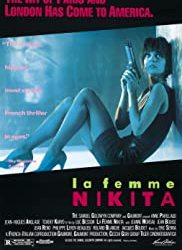
La Femme Nikita (1990)
Genre: Action
Who's In It: Anne Parillaud, Marc Duret, Patrick Fontana, Tcheky Karyo, Jeanne Moreau, Jean Reno
Who Directed It: Luc Besson
Plot: Convicted felon, Nikita, isn't going to jail; she's given a new identity and trained, stylishly, as a top secret spy/assassin.
Run Time: 117 Minutes
IMDB Score: 7.3
Metascore: 56
Rotten Tomatoes Score: Critics 89% Audience 84%
Why I Watch It: The trailer and the plot.
How I Watched It: Saw it the first time when it came out in theatre, then again as a rental.
Random Thoughts: Well this film has an American Remake and not one but two TV shows. Plus there's been a few movies just in the past couple of years with very similar premises. One by Luc Besson.
Let's talk a little about Besson, very problematic. He had been mentioned in the Me Too movement and let's say he doesn't seem very nice. I'm just going to talk about him as a filmmaker. I'm reviewing the film not him.
A little side note this was the first foreign or sub-titled film I ever saw in the theatre. Of course it would be an action film.
What I Liked: First off the film is carried by Anne Parillaud, she's great in this and she does everything asked. She has so many beats in the film and also has to pull of this tough and damaged character, be sexy, carry the action and to be fair the whole film, she's pretty much in every scene for the most part. She does it so well you forget how hard pulling off a layered performance and being credible in the action scenes, usually something suffers but not here. The really cool thing about La Femme Nikita is that sorry for this very cool, It's sexy, it moves well the action set pieces are good. The thing about this Nikita is that it's very well rounded, we have character, we have her story and we have the action. For my money this is the best women is trained to be an assassin film. Assassin hit woman same thing. What they do well is we get to she her do her job and try to balance her life so the film takes sometime to flesh her out. She's not a killing machine, or a sex machine, he's layered and she's good at what she does.
Besson has a certain style and he's very much style over substance for the most part in his career. Here it's not too much, the action fits, the style just makes it cooler and he has Parillaud to be his ace in the hole cause she makes the audience care, this could have been a heartless movie, just kills and violence but we get more here. I want to give a shout out to Tcheky Karyo who is very good here, and is a very good actor who I think is underrated but he's done some great work in France and America. Also French legend Jeanne Moreau shows up in the role you would think she would have and it's always great to see her. Plus an early role from Jean Reno, this is the first time I had seen him and never forgot him.
What I Didn't Like: Yes this kind of set up the cliches in this sub-genre and I have to say the she's trying to have a normal life, get a boyfriend and try to be normal is a tad boring. The boyfriend is bland he's the nice guy and we know why he's there for me it slows down the action and momentum of the film. I know why it's there but I'm not invested in that part.
It is long but it doesn't drag that much, the only other nitpick I have it is at times a very dark looking film, the beginning is too dark.
Final Thoughts: I recommend this one a very well acted, action paced film. Boy that sounded like a bad quote on a movie poster.
Rating: 7/10
2 notes
·
View notes
Text
Alright it’s time Critical Role Campaign 3 Episode 1 Thoughts:
-Oh God it makes me so happy to see them back at the table together
-that ad was surprisingly normal... is sam okay?
-ah there it is
-not gonna lie... that was actually kinda catchy
-sorry matt it’s a thing now
-european store? great news for us... not so great news for our wallets...
-starting at level 3... so everyone should have their subclass already... cool
-imogen, human, sorcerer for laura
-laudna, warlock/sorcerer, for marisha ...looks like a vampire?
-security camera birds... that’s cool
-ahh bureaucracy... good thing beau isn’t here. she would have punched that woman in the face already... and she would have deserved it
-read thoughts? abberant mind sorcerer maybe?
-okay laudna is great
-ashton, earth-genasi, barbarian for taliesin
-ashton is a mood
-Fresh Cut Grass, Warforged? cleric for sam...
-robbie?!?
-oh my gods it’s the Ash Holes!!!!! yes i know they decided on crown keepers but i like ash holes more
-i’m kinda sad that opal isn’t with them... she was my favourite
-dorian is clapping for the pilot... that immediately makes him my least favourite character in all of critical role... WHY DO PEOPLE DO THAT?!?
-wait didn’t aabria give them like a billion platinum? and several super strong magic items? that seems like a real problem for balancing
-wasn’t he still wearing the earring? how did fearne do that?!? i had someone rip off an earring once and belive me you would notice that... it hurts... and bleeds... like a lot!!!
-okay they’re fighting furniture now... BEAUTY AND THE BEAST PROTOCOL EVERYONE!!! yes that’s a Oxventure reference
-channel divinity: sympathetic binding? so F.C.G. is a homebrew subclass?
-WHAT THE FUCK MARISHA?!?
-feels wierd to have someone rage without travis cheering them on
-gravity build? ashton is homebrew too?
-travis is here!!!!
-so travis is... just some old dude?... he didn’t even get a character portrait
-a spiritual tomato... never change sam... never change
-”I’m gonna fuck the rug” - marisha ray 2021
-F.C.G. can take the damage for his teammates? that reminds me of my Oath of Matyrdom Paladin
-bertrand is level 5? So he’s probably just temporary right?
-okay lisa just told me that Bertrand is from some one-shot from Campaign 1 but apparently he was level 18 in that... confusing
-SAM!!!! just... why?
-INSIGHT CHECK!!!! Oh i’ve missed that
-and he stole the fucking earring! AND GOT PAID FOR IT!!!
-We’re only at the break now?!?
-i just love these first party meetings everyone is always so awkward and mistrusting at first
-lisa just cheered when marisha said that Laudna is from whitestone
-wow travis is really trying to make this guy every stereotypical old person ever huh?
-orym seems like he’s already regretting everything
-so dorian basically just went: “anyway here’s wonderwall”
-this is already so much chaos! and we’re only in episode 1
-you know i never thought about if warforged need to take a shit
-okay apparently they don’t... they just vomit out what they can’t process
-what a fucking cliffhanger
Final Thoughts: What the Fuck! i was not ready for any of that. these characters are great. I do feel like bertrand and maybe the Ash Holes aren’t going to be permanent members of the party though... Imogen seems genuinly nice which is rare for DnD characters, F.C.G. is... well... sam..., Ashton is really cool and i really wanna know what laudnas whole deal is she’s my favourite so far. anyway i already can’t wait for the next episode
#critical role#critical Role c3#critical role c3e1#critrole#critrole spoilers#critical role spoilers#cr spoilers#jeanne watches#jeanne watches critical role#laudna#imogen temult#fearne calloway#orym of the air ashari#dorian storm#fresh cut grass#F.C.G.#Sir Bertrand Bell#ashton greymoore
23 notes
·
View notes
Text
A Salute to Fox Studios by Raquel Stecher
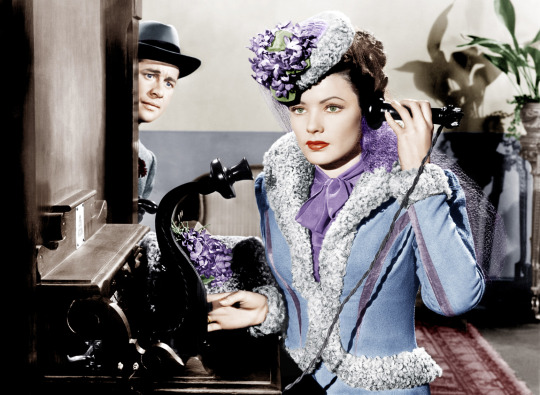
Let’s raise a glass to Twentieth Century-Fox and take a look back to celebrate the studio’s history! And what a rich history it is. When Darryl F. Zanuck’s 20th Century Pictures merged with William Fox’ Fox Film Corporation in 1935, Twentieth Century-Fox was born. Fox and Zanuck were pioneers of the studio system and with Zanuck at the helm it was destined for greatness. In the subsequent decades, Twentieth Century Fox groomed and launched the career of many big stars including Gene Tierney, Spencer Tracy, Dana Andrews, Shirley Temple, Tyrone Power, Marilyn Monroe, Don Ameche, Linda Darnell, Henry Fonda, Carmen Miranda, Alice Faye and Maureen O’Hara. And what’s more iconic than the studio’s classic intro with its rotating search lights, giant logo and horn fanfare? Over the years the studio had its ups and downs and has gone through many transitions but what remains is a legacy that will be remembered in the 21st century and beyond.
My favorite decade of Twentieth Century-Fox is the 1940s. The studio tackled every genre imaginable. There were swashbucklers like THE MARK OF ZORRO (‘40) and THE BLACK SWAN (‘42); films noir like I WAKE UP SCREAMING (‘41) and Fallen Angel (‘45); and romantic dramas like BLOOD AND SAND (‘41) and A LETTER TO THREE WIVES (‘49). Then there were notable literary adaptations like JANE EYRE (‘43) and A TREE GROWS IN BROOKLYN (‘45). For lighter fare the studio offered comedies like HEAVEN CAN WAIT (‘43) and UNFAITHFULLY YOURS (‘48) and musicals like DOWN ARGENTINE WAY (‘40) and STORMY WEATHER (‘43). Add to that their Christmas classic MIRACLE ON 34TH STREET (‘47) plus war films, thrillers, Westerns and more. John Ford’s HOW GREEN WAS MY VALLEY (‘41) still causes ire among best-of-list purists who are shocked that it won the Academy Award for Best Picture over CITIZEN KANE (‘41). For me, when I think of Twentieth Century-Fox in the 1940s I think of these four films in particular.
THE GRAPES OF WRATH (‘40)
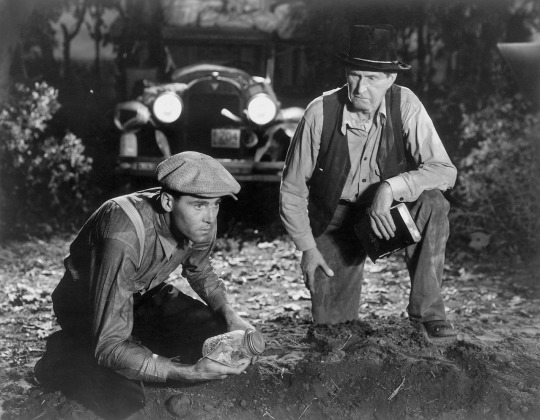
Perhaps one of the most harrowing films ever made, the 1940 adaptation of John Steinbeck’s Pulitzer Prize winning novel still has the power to destroy its viewers emotionally. It’s a deeply moving story that will stay with you for a long time. Set during the Great Depression, THE GRAPES OF WRATH follows the story of the Joad family of Oklahoma who lose their farm and travel across the country for a new beginning and face tragedy along the way. The emotional gravity of the story is delivered through the brilliant performances by Henry Fonda, Jane Darwell, John Carradine and the rest of the cast under the direction of John Ford. The film was celebrated by the critics and was nominated for seven Academy Awards and won for Best Direction and Best Supporting Actress (Darwell).
MAN HUNT (‘41)

Director Fritz Lang’s long career saw him hopping from studio to studio and genre to genre. Lang never did feel at home in Hollywood but he left his mark with many films including one of my all-time favorites MAN HUNT. This WWII drama stars Walter Pidgeon as British sniper Captain Thorndike who is on a mission to assassinate Hitler. He’s on the run from the Nazis and along the way he befriends Joan Bennett’s Jerry, a feisty Londoner who becomes his sidekick/pseudo love interest and Roddy McDowall’s Vaner, a ship’s cabin boy. The story culminates in a thrilling showdown between Pidgeon and George Sanders’s Nazi war general. The screenplay had to be altered to meet the Production Code but the end result still delighted audiences and critics. According to historian M. Todd Bennett, MAN HUNT, was one of a slew of pro-British films that boosted American support during WWII.
LAURA (‘44)
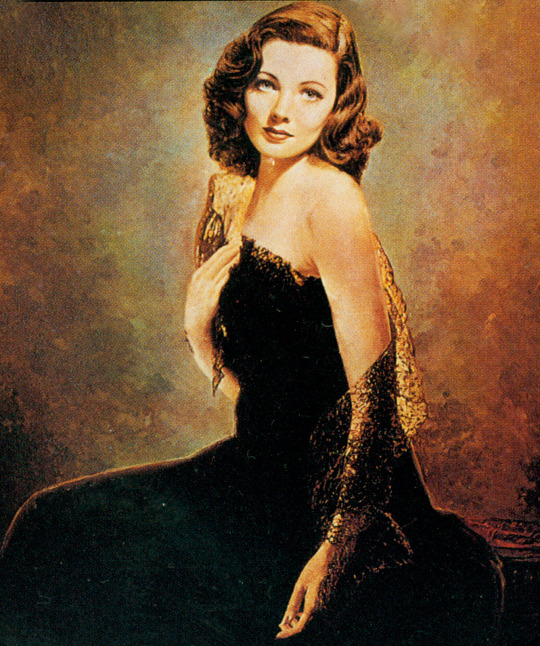
Based on Vera Caspary’s short story, LAURA has entranced audiences for decades, with its haunting score and an intriguing mystery that lures the viewers in and holds them hostage. Then there are those iconic performances. Gene Tierney will always be Laura and Clifton Webb will always be Waldo Lydecker as long as fans have anything to say about it. Let’s not forget the two other men caught in Laura’s snare, Dana Andrews and Vincent Price. The film was directed by Otto Preminger who had a falling out with Darryl F. Zanuck and LAURA proved to be the film that ended the feud and revitalized Preminger’s Hollywood career. LAURA won the Academy Award for Best Cinematography, Black-and-White and was nominated for other categories including Best Supporting Actor (Clifton Webb), Best Screenplay, Best Art Direction-Interior Design and Best Direction. I always recommend LAURA to classic movie skeptics and it wins them over every time.
LEAVE HER TO HEAVEN (‘45)

Gene Tierney’s cool murderous stare behind a pair of sunglasses as she watches a young boy, played by Darryl Hickman, drown is one of the most chilling scenes in film history. The actions of Tierney’s character Ellen are still as shocking today as they were over 80 years ago when LEAVE HER TO HEAVEN hit cinemas. Directed by John M. Stahl, the film is shot in Technicolor and features an amazing cast of players including Cornel Wilde, Jeanne Crain and Vincent Price. It was a hit at the box office and became the highest-grossing film of the decade for Twentieth Century Fox. Contemporary audiences still love the film for its salacious melodrama and gorgeous aesthetics. It won the Academy Award for Best Cinematography and its star was nominated for Best Actress in a Leading Role, her first and only nomination.
#20th Century Fox#Twentieth Century Fox#Gene Tierney#Henry Fonda#Leave Her to Heaven#Laura#the grapes of wrath#Man Hunt#Fox Studios#Raquel Stecher#TCM#Turner Classic Movies
93 notes
·
View notes
Note
I have a question!! Pick me cent!! Which servants are your favorites and why? o: what made them stand out to you?
hNGHNGHGNHGNGH
MEDUSA - i’m a slut for medusa what else do you want to know… she’s also the reason why i got into fate! if there’s anything about greek myths that i know best, it’s about her. i’ve been reading about medusa for like??? seven years now so i was very intrigued about the role she plays in fsn. i was very disappointed at the first two routes and then heaven’s feel came around and slapped me in the face. the things i hate about fate’s medusa are her frequent sexualization, the portrayal of her relationship with her sisters and then there’s that dumbass commentary about perseus being a successful shinji like how wrong can you be…
MEDEA - IM NOT SAYING I HAVE A BIAS BUT……………. anyway medea is that sort of character that doesn’t need to have a romantic route in order to gain depth. fsn did not make her waifuable. she siblingzones you in fgo. we stan? we stan. there’s just a lot to mention here and im scared that i’ll go on a long tangent about my love for her but she’s amazing and very underrated and therefore you must all love her better. i hate the fact that jason’s suffering as a character in order to emphasize her more though like you can do that without making her “uwu i was a victim” because medea when she was betrayed spit on his face and laughed at his helplessness im not saying she wasn’t a victim im just saying she wasn’t some weak little girl who couldn’t save herself and whose soul was lost in jason’s betrayal
OZYMANDIAS - love at first sight. no, really. my love for ozy began with watching prince of egypt and then picking fate prototype and from there reading a lot of research materials concerning the life of ramesses ii. he is obnoxious as a whole because he’s really just made to have a dick size contest with gil but they’re both great i just love ozymandias better cause i grew up reading about him and im personally in love with characters who love their significant others deeply
KARNA - i was meant to mention cu but i already mentioned that dog in some other post. karna was another muse that paved way to so many of my friendships with fate rpers here! reading the apocrypha light novels made me heavily interested in mahabharata. he’s so interesting in fate, but i was sort of turned off when i realized that they made fate karna too much of a pillar of goodness when he wasn’t exactly that? he has his moments to be criticized. anyway karna is beautiful and everyone who says he’s whitewashed needs to take a look at surya first.
ATALANTE - do you ever just think about a girl at night before you sleep and cry real hard? this is me with atalante like i legit just cry whenever i think about her from what she went through as a child and how she was in apocrypha wherein she literally went ape shit because of jeanne and it just hurts to watch because it may seem like an impossible dream or even childish when you think about it, but there’s just a purity in it that would be a miracle to understand if you’re not someone who knows what it feels like to be abandoned and unloved? i think about this all the time and how that speaks volume, always. i just hate how they wrote her feelings towards jason it’s so accurate and stupid but i forgive them because atalante did nothing wrong
10 notes
·
View notes
Photo
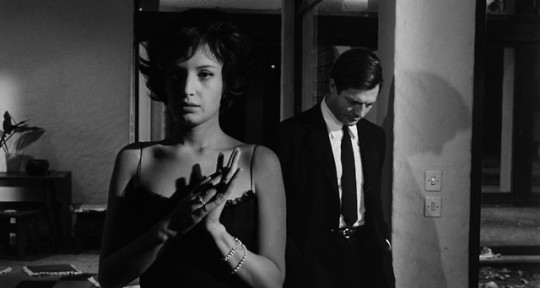

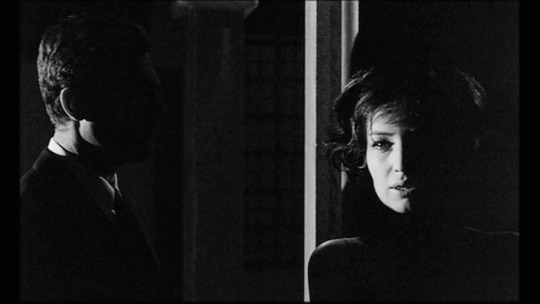
you only care about who lose. Typical of intellectuals, selfish but so full of pity!
eclisse inspirations, vol. V
Michelangelo Antonioni’s Trilogy of incommunicability
part. 2 - La notte, 1961
“one question I am often asked is why the women in my films are more lucid than the men. I was raised among women: my mother, my aunt, and lots of cousins. Then I got married, and my wife had five sisters. I have always lived among women; I know them very well... Speaking for myself, I find that the feminine sensibility is a far more precise filter than any other to express what I have to say. In the realm of emotions, man is nearly always unable to feel reality as it exists. Having a tendency to dominate woman, he is tempted to hide some of her aspects from himself and see her as he wants her to be. There is nothing absolute in this area, but it seems to me that is at the heart of it
Michelangelo Antonioni
In reviewing the critical reception of La notte (1961), it strikes me that many observers seem to almost completely miss the fact that the film is, in part, a feminist critique of capitalist society, which centres around women, consumption, and the failure of our ecosystem, and not just the director’s trademark alienation and ennui.Conventional plot summaries of the film routinely insist that La notte centres around a male author, Giovanni Pontano (Marcello Mastroianni), his uncertain career, and his failing relationship with his wife, Lidia (Jeanne Moreau), as well as his flirtations with beautiful socialite Valentina Gherardini (Monica Vitti)
I would argue, rather, that women are both the centre of the film and the mirrors upon which Antonioni reflects his dark perceptions and stark conclusions about the human condition. At a launch party for his latest novel, those who celebrate Giovanni’s newest book spend precious little time actually reading, opting instead to party all night, while simultaneously remaining oblivious to their own mortality. As in most of his films, Antonioni’s wealthy protagonists in La notte live in a hell of their own making. So thoroughly alienated are they from one another (and from the environment) that they experience the rain from the sky (in the pool sequence) as a sublime rapture from above, giggling like schoolchildren, briefly lifted out of their stupor for a moment’s play with the actual elements. The tragedy of Antonioni’s characters is not simply a matter of bored bourgeois ennui; these people are disconnected from the feminine, from the earth, and from life itself. Perhaps no critic got it more wrong than Pauline Kael in her infamous essay The Come-Dressed-As-the-Sick-Soul-of-Europe Parties: La Notte, Last Year at Marienbad, La Dolce Vita, in which Kael attacked the film, demanding less ambiguity: La notte is supposed to be a study in the failure of communication, but what new perceptions of this problem do we get by watching people on the screen who can’t communicate if we are never given any insight into what they could have to say if they could talk to each other? On the contrary, Antonioni gives us nothing but insight into the various relationships, and thus I find her dismissal baffling. More recently, critic Christopher Sharrett takes a far more perceptive feminist eco-critical approach to key Antonioni films such as Il deserto rosso (Red Desert, 1964) and L’eclisse (1961), noting of L’eclisse that “the failure of people to connect is rooted less in vague existential dread than in concrete social realities”. For me, it is those specific social realities that are most vividly explored and exposed in La notte. Antonioni’s key, early films are best understood from the point of view of a feminist director – keeping in mind Antonioni’s own philosophy, as noted above, “the feminine sensibility is a far more precise filter than any other to express what I have to say.” Sharrett’s perceptive comments on Red Desert also apply to La notte. He notes that Red Desert is:
“explicit in its insistence that the sensitive individual (who must be, in the director’s view, axiomatically female, with little possibility for the male partaking of authentically human sensibility) cannot enjoy happiness in this end-product of patriarchal capitalist rule. A pervasive theme in Antonioni’s work is the concept ‘Eros is sick,’ meaning that the erotic, the drive for life, is sickened and doomed by the death drive in a society operating under the assumptions of capitalism and repression”
Filmed on location in Milan, the opening credits shot is a stunner. The camera glides in a long track down the exterior of a glass-facade building, suggesting a descent into hell. Images of nature are fleeting in La notte – a few scrub trees in a desolate urban environment; the sky violated by amateur rocketry competitions; unfinished buildings everywhere – depicting Milan as an unnatural colonization of the feminine earth.
Humans in La Notte shuffle along resembling zombie-like “sleepwalkers.” Specific allusions to sleepwalking abound, the most direct being a reference to Hermann Broch’s classic 1932 novel, which Giovanni picks up at the party with an air of surprise, wondering aloud, “Who is reading The sleepwalkers?” Broch’s own obsession with the death of values and the decay of humanity mirrors La notte’s central preoccupation with mortality as it relates to the value of love and art (as Eros). Mortality is omnipresent in the opening sequence in a hospital room, where Giovanni and Lidia visit their dying friend, an author named Tommaso (Bernhard Wicki). Tommaso wonders aloud if any of his life’s work is of value, and ironically Giovanni himself is battling the same sorts of questions, the central post-war preoccupations of modernism; self-doubt, alienation, and existentialism. Giovanni’s self absorption precludes him from a loving relationship with his wife, Lidia, who patiently waits for him to grow up during the entire length of the film. Antonioni crafts our perspective so that we see Giovanni primarily through Lidia’s point of view. Though he is unfaithful, selfish, and childish, Lidia still loves Giovanni, but she is keenly aware that their marriage is barely alive. Lidia observes Giovanni trying to woo the stunning young Vitti, but instead of protesting, she seems to almost push her husband into Valentina’s arms through her powerful gaze. Though Moreau is said to have disliked the role of Lidia, it is one of her finest performances and most of her power is established through her active gaze. In a strong and memorable sequence, Lidia wanders the streets looking at life going on around her, watching the activities of workmen and women of all types. Lidia seems keenly aware that life is going on around her, but in many ways without her, as she feels the pain of her own mortality and her unraveling marriage. Antonioni clearly empathizes with Lidia strongly.
A particularly acute feminist moment comes when Lidia witnesses some young men fighting near a construction site seemingly for no reason at all. The fight summarizes patriarchy in a nutshell; macho, pointless, violent and dangerous. There is a brief moment when we think that perhaps Lidia will be hurt or even raped by the men, but she shoos them away and calls Giovanni to pick her up. The couple wanders through the nearby railway tracks where they first met and fell in love, even as the environment has taken over, and numerous wild plants have sprung up since they last visited, many years ago. Eros is still possible, even between these two. Thanatos has not won yet. La notte makes it clear that women’s artistic talents are wasted in a society that values them only for their beauty. As if to demonstrate this, in one telling sequence, Valentina uses a tape recorder to tell a story to Giovanni. She is a far better storyteller than the author, but after she finishes her narrative, Valentina erases the tape rather than playing it back. We hear a whiny, high-pitched squeak as the recorder rewinds the tape, thus destroying her story – and making us acutely aware of the myriad untold stories of all women. Whether or not Lidia and Giovanni’s marriage is saved at the end of La notte seems insignificant in light of the larger issues raised by the film. Antonioni offers us far bigger issues to contemplate. What have humans made of the earth? How do we love one another? What is the value of women, art and love in a world defined by men of commerce? Can we wake from our sleepwalking? These are but a few of the questions raised by La notte, a masterwork that only gets better with time, provoking a wakeful regenerative response to 21st century consumption, devaluation of Eros, and our reckless destruction of the natural world.
[by Gwendolyn Audrey Foster, February 2015]
#eclisse#filmmaking#filmproduction#cinema#arthaus#michelangelo antonioni#monica vitti#italy#tumblr#artists on tumblr
113 notes
·
View notes